Abolition A-Z
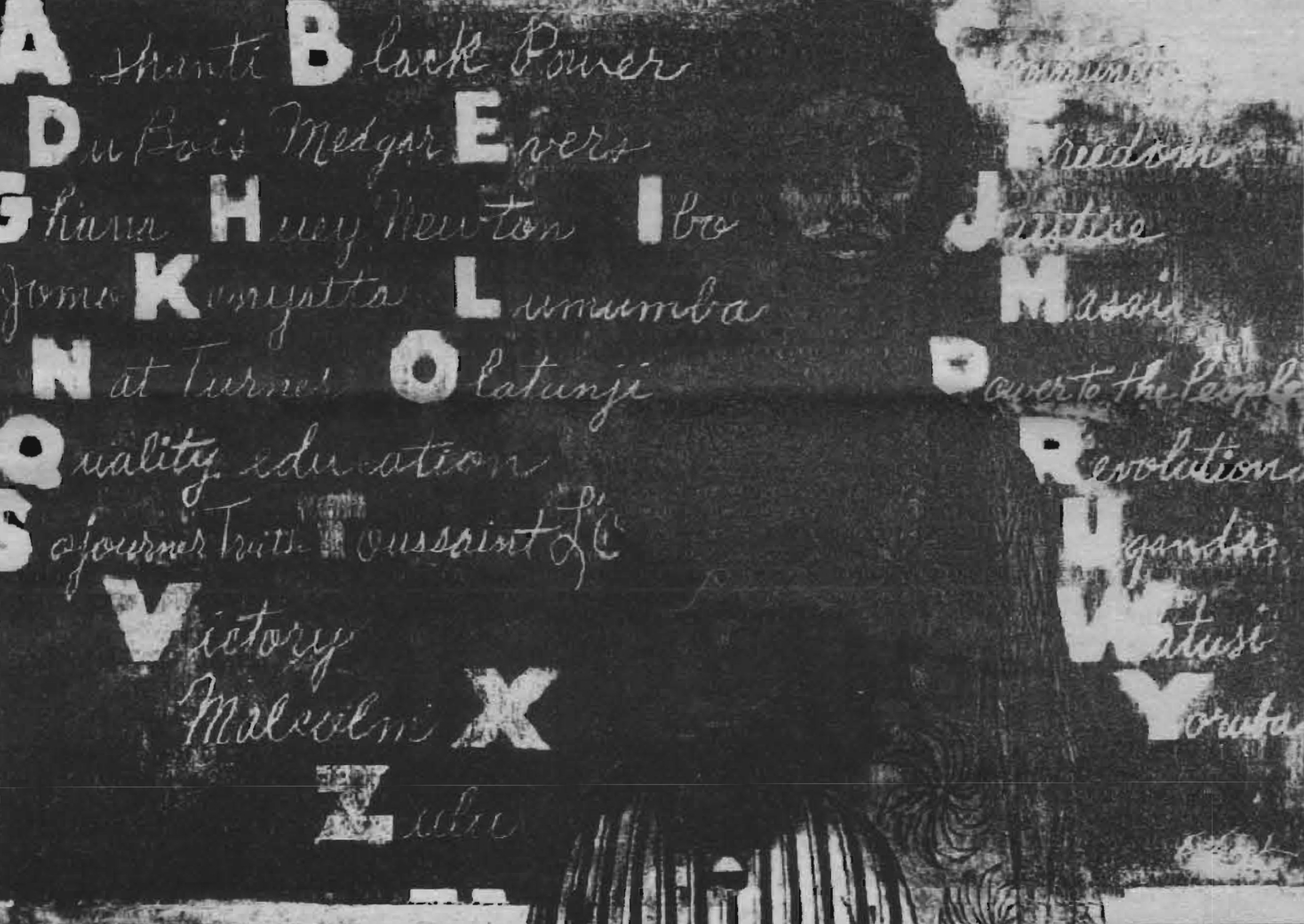
Preface (not in the audio): What follows is a polyphonic soundscape of abolitionist politics. It can be listened to, read, or both, in full or part. It explores an abolitionist politics that holds to the total refusal of the current state of things. To abolish state violence, and state power. To negate the present, and the history of the present. To abolish fear, poverty, and misery. To abolish the forces of racial capitalism, the legacies of slavery. To abolish the police, borders and their agents, and prisons. As these demands are heard, so too an abolitionist imaginary unfolds: a process of re-construction or re-imagination that comes out of the total refusal of the present. Abolition here is a process, constructive as much as destructive. One of solidarity and care. Of writing, reading, recording, printing, archiving and disseminating. Of dreams. Of the provision of pleasure and resources and infrastructure. Of lives lived in a world without carcerality and state violence. Let us listen to some of the traces of that world.
Introduction
A is Authority, waving its stick,
B are the Bars, resembling a "nick,"
C is the Cage, against which I kick,
D are the Drugs, which make me sick
E are the Eyes, for ever upon one,
F the Feeling "What have I done?"
G is the Gloom, the whole place pervading,
H is the Hope, in my mind, oft' invading,
I — well, that's I; no more to be said,
Just that I often wish I were dead;
K is the Knowledge stored in my head,
Learned while on the psychiatrist's "bed."
M for Monotony — day in day out.
N for Nurses — God! how they shout!
O is a Circle––no end or beginning,
P is my Patience, to which I'm just clinging.
Q is the Quiet, which I find in my room,
R is the Rainbow, hidden by gloom.
S — "schizophrenic;" write that on my tomb,
T is the Terrible feeling of doom.
U — it's quite Useless to voice a complaint.
Voices; that's when you hear what ain't.
W — Will-power, in me, sadly lacking.
X — "Mr. Anonymous," no front and no backing,
Y — that's You––you're in on this too,
Zealously guarded in Broadmoor Zoo.

This poem was taken from Anarchy Vol.1 No.11 and was the starting point for this piece: an A-Z of Abolition commissioned by Mayday Radio and engaging with documents held on the digital archive platform leftove.rs. The piece is intended to be accompanied by the transcript on the Mayday Radio website, where links to each part of the archive we have used are available, alongside other material. Rather than seeking to define abolition, with each letter our aim is to bring to the foreground a person, a place, an event or an idea from the archive that contributes a perspective on what abolition could be. By providing a series of possible entry points for listeners, we hope to encourage further engagement with the archive and with the subject of abolition.
Excerpt from White Reconstruction with Dylan Rodriguez, Black Power Media, March 15, 2021
Abolition is not an outcome. The reason I feel like I gotta say that so explicitly, is, there's an immediate inclination to postpone abolition as something that is far off over there into the future that we can't fuck with right now. We gotta deal with more immediate concrete shit. So like, one of the phrases... some version of the phrase I hear all the time, that abolition is cool as an eventual goal, right, as an eventual achievement, right, or an eventual outcome. And I always have to say, no no no, you got this all twisted, it is not an outcome, it is a way of doing things, it's a method, it's an analysis, it's a way of organising.
Attica
Excerpt from The Last Graduation, 1997
I think what Attica did - it gave Mr. and Mrs. America an opportunity to look inside these places and see that, wait a minute, everything is not all right here.
NEPA News Vol.1 No.3, December 1973: Attica Legal Defense
Thirty-nine persons died by gunfire on September 13, 1971. The prisoners at Attica had no firearms. All firearms were held by state officials. Yet there have been no indictments against these officials. Instead, 60 of the 1200 men who stood in the yard at Attica have been singled out to be victims of the State's second Attica massacre, one they plan to take place in the courts.
Why did the State wait two years to bring these cases to trial? Why did they beat, isolate, and hold the accused in segregation units? Why did they deny a speedy trial? Why is the Grand Jury still sitting? Why did the State intimidate witnesses and allow them to disappear as they were "transferred" to other prisons, procedures made only too familiar to us by Watergate. The answers we all know. The State is trying to save face through more death and destruction.
The Attica uprising pried away the bars of secrecy and revealed the dehumanizing conditions of prison life. It also revealed the savage domination of the State. The prisoners demanded their basic human rights: the State has responded only with revenge, costing $3 million so far.
Attica is the major slave revolt against cruel and unusual punishment in the American prisons of the 20th century.
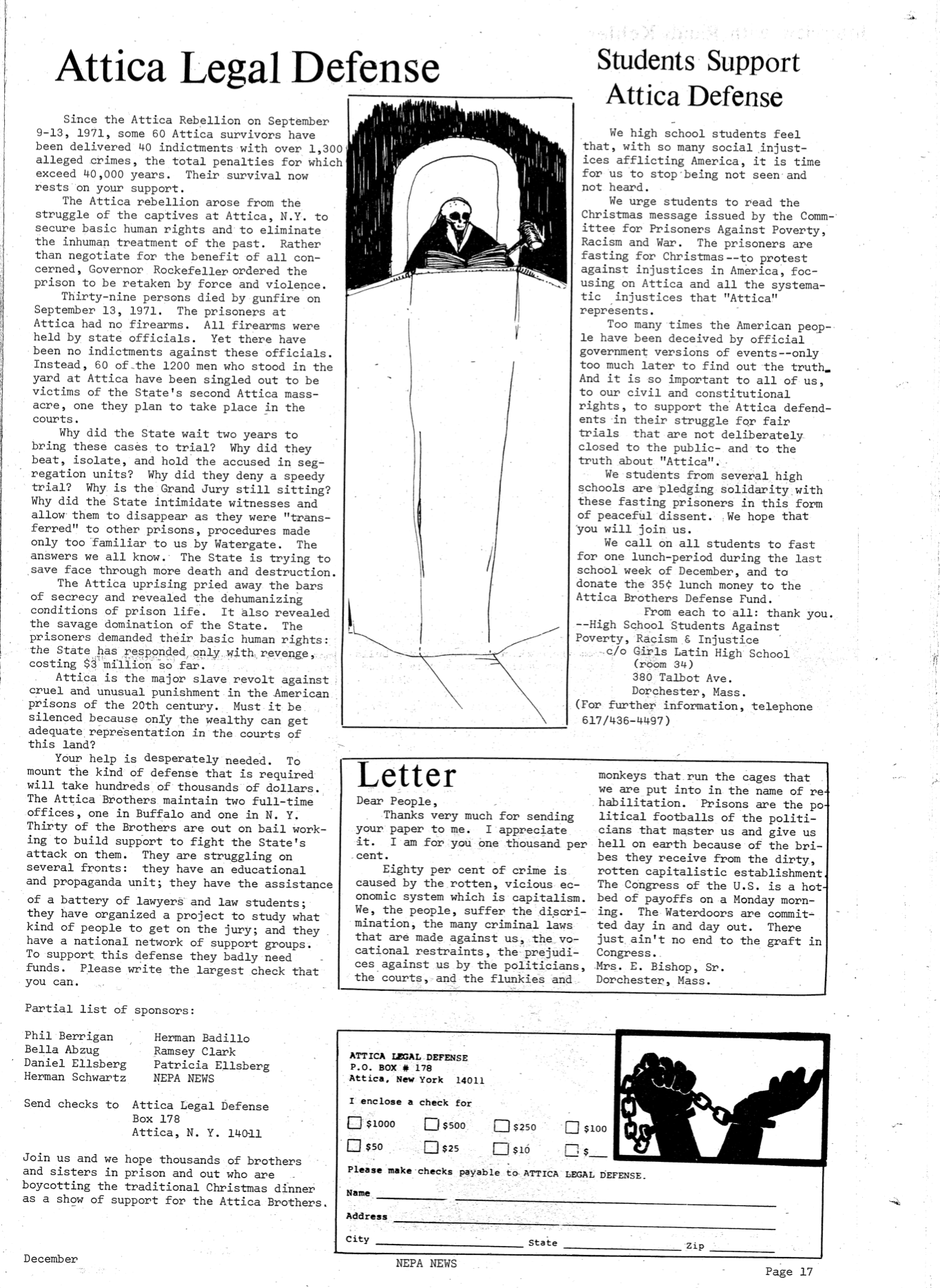
Excerpt from The Last Graduation, 1997
They had to bring indictment, they murdered us there, and they had to have some reason to tell the world why they murdered us. Now, the conditions that were in Attica, they created. We didn't create the conditions, you see? We came there and we were caught up in them, and we spoke up against them. And so because of that, they have these indictments against us.
The Bradford 12
Excerpt from 30th Anniversary of the Bradford 12, 2011
It was July the 11th 1981, and that was a day when there were lots and lots of riots up and down the country in lots of different places, and we'd heard rumours that the national front or fascists or skinheads were coming to Bradford, but the police had gone around and said that, and they told everybody to stay indoors. And we took the view that's totally wrong. We're not going to stay indoors and we're going to get out and we're going to organise people and we're going to fight back. And during the course of the day I did ask one of my friends, Thelojun, at that time, that we should make petrol bombs and we should store them in a safe place and if need be we'll use them.
Free the Bradford 12, July 1981: Free the Bradford 12 - Bulletin of the July 11th Action Committee
On Thursday, July 30th and Friday, July 31st 1981, Officers of the West Yorkshire Police Force carried out a series of raids in Bradford's Black community and seized eleven Asian youths.
[...]
The eleven youths are all members or close sympathisers of the United Black Youth League, a Bradford based independent organisation of Asian, West Indian and African youth.
Following their arrests, the youths were subjected to two days of racial abuse, threats, and brutality by police officers in the main headquarters at Tyrils. They were denied access to solicitors, and relatives and friends were not allowed to see them.
[...]
The campaign to Free the Bradford 12 is convinced that the youths are on trial for their political activities in defence of the democratic rights of Black people in Britain.
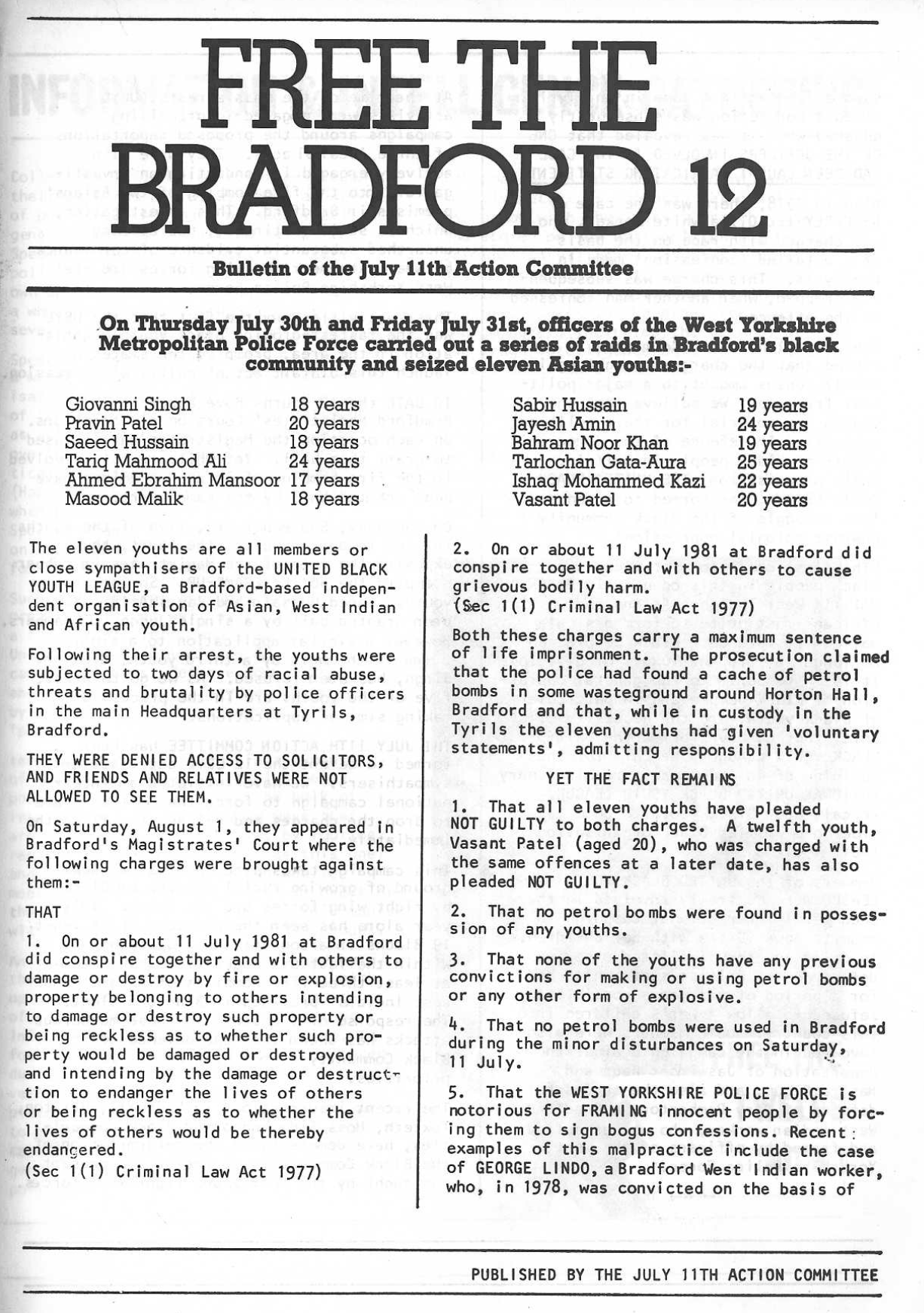
Excerpt from 30th Anniversary of the Bradford 12, 2011
The police and the prosecution believed until the very beginning of the case that the defense was going to be based on denial of any involvement in any activity to do with the making of petrol bombs.
[...]
We argued, in a sense, that we did make them. We would have used them.
[...]
You know, here was a group of people that wanted to defend the city against any sort of threat of extreme right-wing groups coming into the city. And they had prepared some petrol bombs, which they didn't use. Nothing really happened in Bradford. And, you know, I believe that self-defence is no offence.
Conditions
Excerpt from Covid 19, Decarceration, and Abolition, Ruth Wilson Gilmore, April 28, 2020
Abolition is about abolishing the conditions under which prison became the solution to problems, rather than abolishing the buildings we call prisons.
Anarchist Black Cross Bulletin No. 5, 1993: Cover image.
Schools.
Housing.
Health.
Youth.
Employment.
Libraries.
Drug treatment.
Homeless shelters.
Parks.
Arts and culture.
Community services.
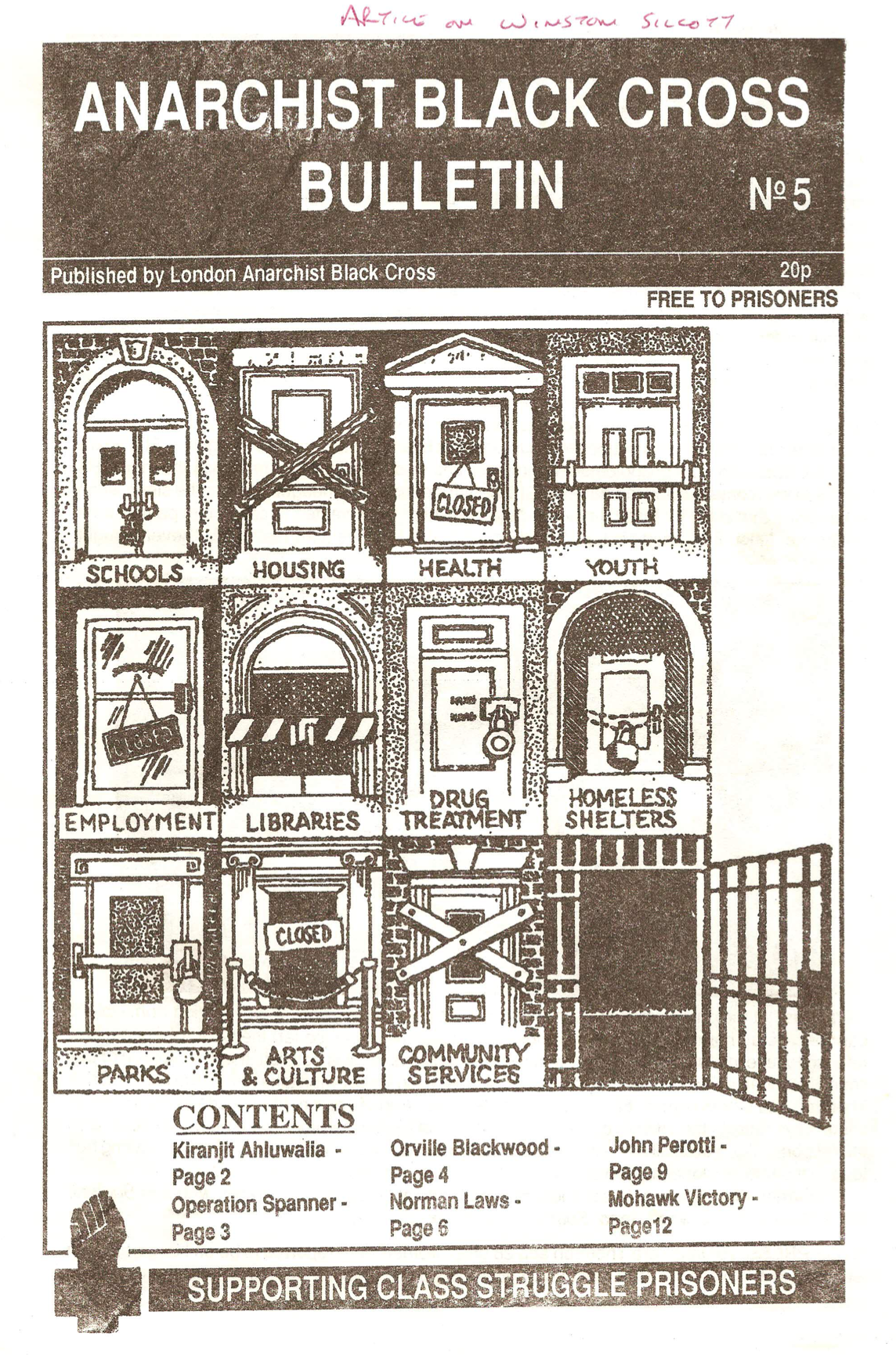
Excerpt from The Last Graduation, 1997
In New York State, there's 70 thousand people in prison, and of the 70 thousand, almost 80 percent of them, four out of five, come from seven neighbourhoods in New York City. That's phenomenal when you look at it on its face. And the reason that's phenomenal is because those seven neighbourhoods are the most economically devastated neighbourhoods in the state, and economic and social devastation produces pathological behaviour and irregular behaviour that inevitably runs into a collision course with law enforcement. I mean, we know these things, so what should the prescription be? Should the prescription be to build more prisons or to attack the economic devastation?
Excerpt from Democracy Now, Angela Davis, June 12, 2020
[...] Abolition is not primarily a negative strategy. It’s not primarily about dismantling, getting rid of, but it’s about re-envisioning. It’s about building anew. [...] So, abolition is really about rethinking the kind of future we want, the social future, the economic future, the political future. It’s about revolution, I would argue.
Dreams
Excerpt from Go 'Way Devil Leave Me Alone (Part 1 & 2), Mary James, 1934-1947
Wake up Rosie, tell your midnight dream.
Wake up Rosie, tell your midnight dream.
Midnight dream good Lordy, midnight dream.
Wake up Rosie, tell your midnight dream.
Excerpt from Jackie Wang: The Sunflower Cast a Spell to Save Us From the Void, LA Review of Books, Jackie Wang, 2021
There was an event where they brought a number of people who work on prison issues to read the poems that incarcerated people had submitted to the prison writing competition and so, so, so many of the poems were about dreams, if they were in solitary confinement and if we're going back to what we're discussing at the beginning of this interview, the way in which when your body is physically confined and immobilised, that in a sense forces you into your dream life, and it can have a really, really dramatic effect on your dream life and your dreams can become more vivid when you're in confinement.
The Abolitionist No.30, Fall 2018: The Prison Abolitionist Imagination, Jackie Wang
THE DIALECTIC OF DREAMING
Dreams and reality are opposites. Action synthesizes them.—Assata Shakur
Before Assata Shakur was liberated from prison, her grandmother and family came to visit her, bearing a dream: “You’re coming home soon,” her grandmother said. “I don’t know when it will be, but you’re coming home. You’re getting out of here. It won’t be too long, though.” She went on: “I dreamed we were in our old house in Jamaica... I was dressing you ... putting your clothes on.” Assata’s grandmother was known for her prophetic dreams—they came when they were needed, but it was ultimately the responsibility of the recipients of the visions to make them real, not only by believing in the veracity of the prophecies, but by acting so as to give them flesh.
When Assata returned to her prison cell, she could not help but dance and sing. She writes, “No amount of scientific, rational thinking could diminish the high that I felt. A tingly, giddy excitement had caught hold of me. I had gotten drunk on my family’s arrogant, carefree optimism. I literally danced in my cell, singing, ‘Feet, don’t fail me now.’ I sang the ‘feet’ part real low, so I guess the guards must have thought I was bugging out, stomping around my cage singing ‘feet,’ ‘feet.’”
When we act in accordance with the prophetic dream, the dream comes to directly constitute reality.
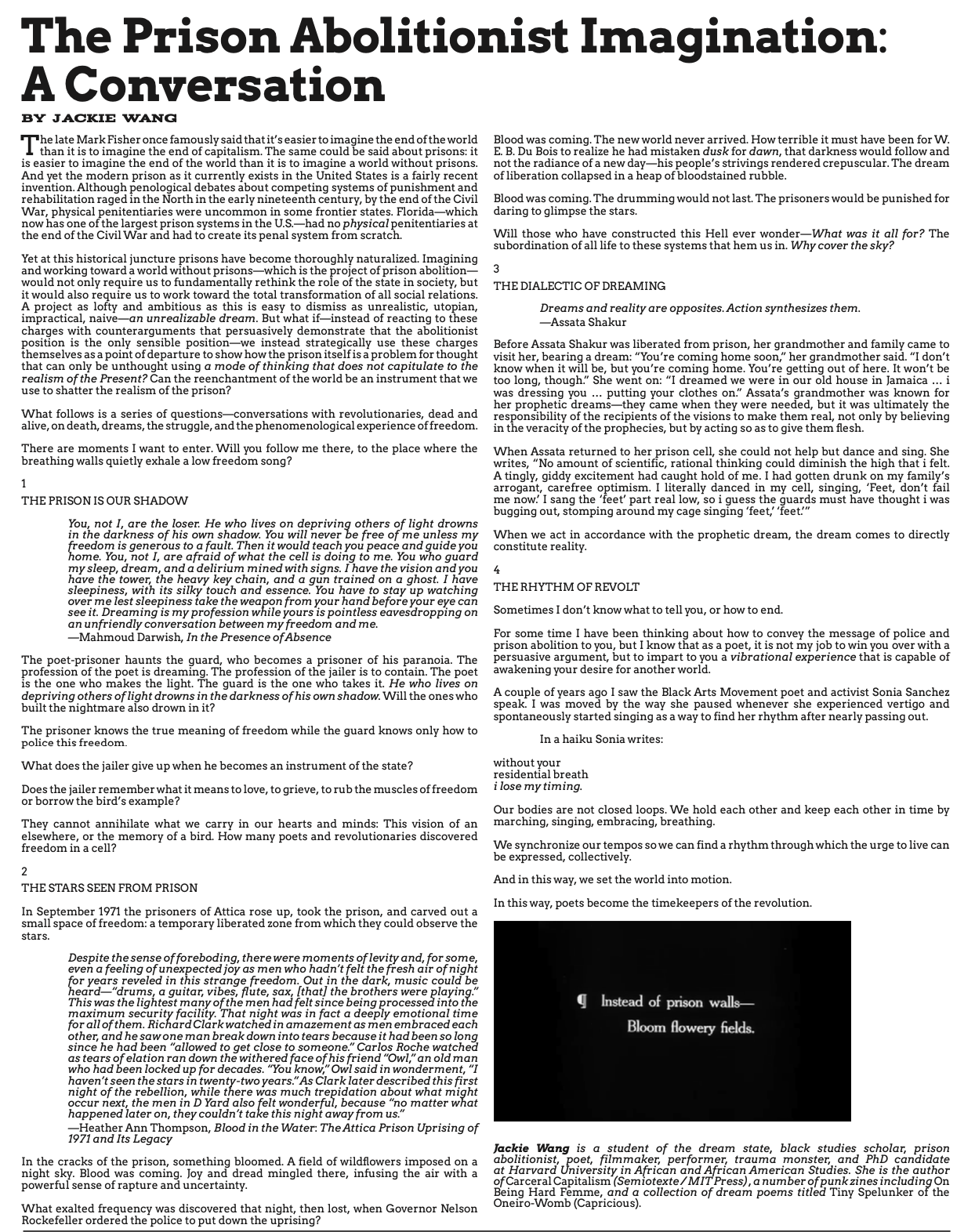
Education
Excerpt from The 10 Point Program of The Black Panther Party, Bobby Seale, 1968
Number 5: We want decent education, for our black people in our communities, that teaches us the true nature, of this decadent racist society, and to teach black people and our young black brothers and sisters their place in society, because if they don't know their place in society and in the world, they can't relate to anything else.
Excerpt from The Last Graduation, 1997
Prisoners, very early I think, recognized that they needed to be better educated, that the more education they had better they would be able to deal with themselves and with their problems and with the problems of the prison and the problems of communities from which most of them came.
NEPA News Vol.1 No. 2, November 1973: Self Education, Richard Schofield
Brothers and Sisters –
Political consciousness should be priority in educating ourselves as well as our brothers and sisters. So study groups should be set up. I wish to take this time to evoke a few essentials relating to political consciousness.
First, why is political consciousness essential? As people under a capitalist system which does its utmost to keep people politically uneducated, we are kept entirely divided. Capitalism keeps people divided by means of economic strata, radical tactics, chauvantistic attitudes, etc. I could go on but I feel the point is across.
Once we realize what we're dealing with, it is up to us to liberate ourselves and, in turn, help bring forth a political understanding, both in our prisons and on our streets.
Therefore, systems of all kinds should be thoroughly analyzed, – cultures, countries, the role which capitalist-imperialist governments play and why they play it, and so forth. Learning to understand capitalism-imperialism as "The true enemy of man."
However, in order to attain direction, in order to eliminate capitalism – imperialism, hard, disciplined studies must take place, the analyzing of internal and external contractions of capitalism.
Those of us who are or who have been incarcerated know we can either work for the time or have the time work for us. I prefer the latter, and I'm sure, as brothers and sisters, you do also.
Perhaps you could discuss and decide what you are to seek – individual or the people's benefit. Many of you doing time have a short amount of time left. Therefore it is essential that you gather as much wisdom as you can, so you can apply yourselves collectively to the struggle when you are on the street, for your brothers and sisters behind the wall as well as those outside.

Fleury-Mérogis
Os Cangaceiros No. 2, November 1985: Prisoners' Talking Blues - Chronology, Yves Delhoysie
5 mai : À Fleury-Mérogis, les détenus du D4 se soulèvent et détruisent toutes les installations.
6 mai : Toujours à Fleury, au D1, 300 personnes refusent de remonter en promenade: une soixantaine incendient l'infirmerie.
6 mai: À Bois d'Arcy, une quinzaine de détenus mineurs montent sur le toit, où ils resteront jusqu'au 9 mai, soutenus et ravitaillés par les autres.
8 mai: À Lille, une dizaine de détenus montent sur les toits. À Bastia, grève des plateaux en solidarité avec d'autres prisons.
9 mai: À Fresnes, 400 mecs sur les toits. Affrontements avec les flics, qui tuent un détenu. À Compiègne, une dizaine de détenus sur les toits, relaient l'équipe du matin. À Bonne-Nouvelle (Rouen), une cinquantaine de mineurs montent sur les toits, tandis que les autres saccagent leurs cellules ; après un semblant de négociations, une trentaine regrimperont sur le toit le lendemain, en solidarité avec Fresnes.
10 mai: Du 9 au 10, des détenus montent sur les toits à Douai. Affrontement bref avec les CRS. À Amiens, une cinquantaine de détenus montent sur les toits. À Nice, une soixantaine de détenus sur les toits sont rejoints, pendant l'affrontement avec les flics, par une vingtaine de mineurs. À Béziers, durant plusieures heures, 130 détenus prennent en otage 3 matons et un infirmier. [...]
---
May 5: In Fleury-Mérogis, the detainees of the D4 wing riot and wreck the whole wing.
May 6: Again in Fleury, 300 detainees from D1 wing refuse to return to their cells after their hour of exercise; sixty of them set fire to the infirmary.
May 6: In Bois d’Arcy, about fifteen juvenile detainees climb onto the roof, remaining there until May 9th, supported and supplied by their fellow prisoners.
May 8: In Lille, ten or so detainees climb onto the roof. In Bastia, detainees refuse to eat prison food in solidarity with the other prisons.
May 9: In Fresnes, 400 men climb onto the roofs and clash with cops, who kill one detainee. In Compiegne, a dozen prisoners climb onto the roofs, relieving those of the morning shift. At Bonne Nouvelle prison in Rouen, about fifty juvenile detainees climb onto the roofs while other prisoners wreck their cells; after tentative negotiations, about thirty climbed back on the roof in solidarity with Fresnes. [...]
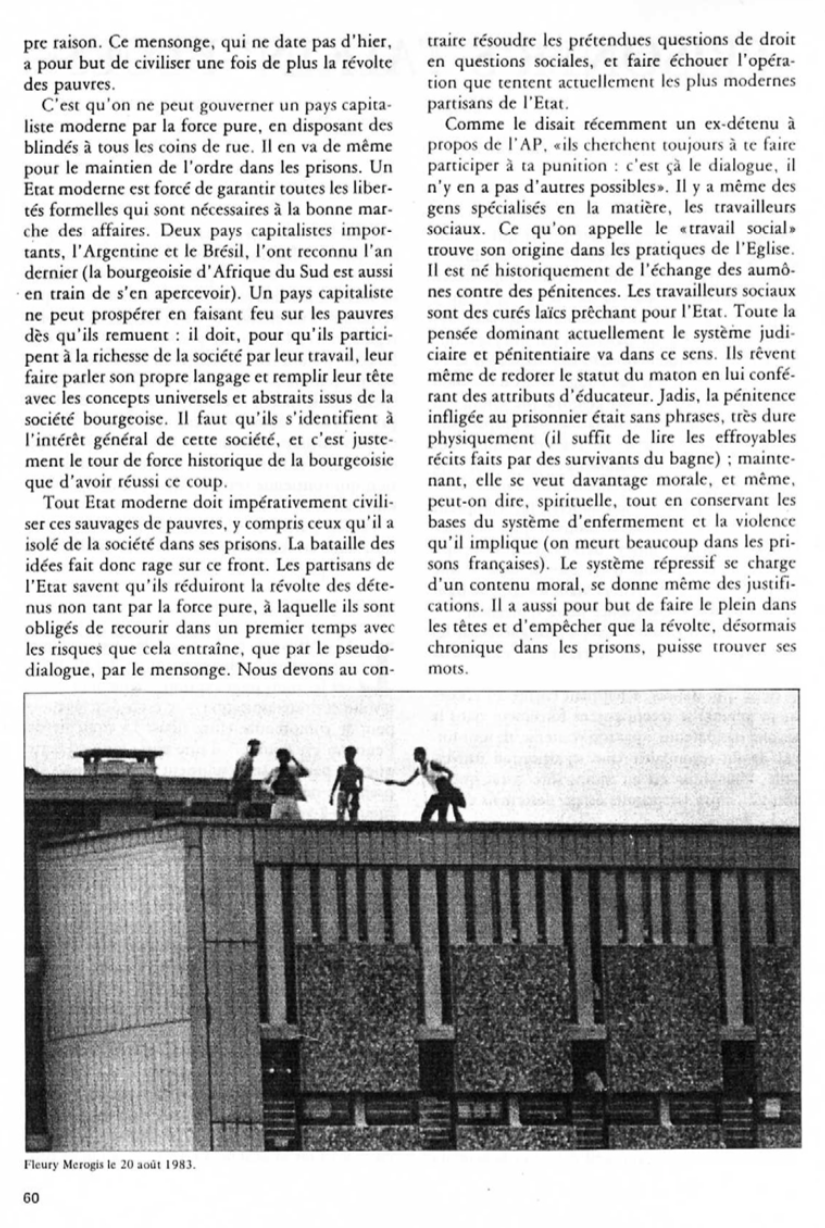
Gender
Excerpt from Abolition Feminism, CRG Distinguished Guest Lecture, Angela Davis, October 23, 2020
But I can remember very vividly the remarks of a young woman who had been imprisoned here in the state of California, who pointed out that she had been subject to sexual abuse when she lived in the so-called free world. And once she went to prison, the abuse felt exactly the same.
Challenging State Violence
Many women of color have consistently recognized and highlighted the contradictions inherent in our almost exclusive reliance on law enforcement to address violence against women. The challenge, however, is to move beyond current approaches to violence. The anti-violence movement can no longer continue to advocate for more or “better” use of state force to protect women and communities of color and remain silent in the face of evidence that law enforcement-based responses to violence in fact lead to further violence against women, and particularly women of color.
At the same time, movements challenging state violence, and particularly the anti-police brutality movement, have failed to recognize that women of color are also targets of law enforcement violence in our own right. It is time we took up the challenge of responding to state violence against all members of our communities, rather than focusing exclusively on the experiences of young heterosexual men of color. Although we often provide critical leadership and woman power to anti-law enforcement and anti-prison organizing, women of color who are themselves subjects of state violence find themselves with very few spaces in which their experiences are reflected and integrated, leaving their voices largely unheard and their experiences unaddressed.

Excerpt from Democracy Now, Angela Davis, June 12, 2020
Abolition feminism counters carceral feminism, which has unfortunately assumed that issues such as violence against women can be effectively addressed by using police force, by using imprisonment as a solution. [...]
The Hull Prison Riot
Don't Mark His Face - Hull Prison Riot, 1976: D. Foley
No one is going to pay any attention to what happened at Hull because it is only prisoners it has happened to, but I would like to say what happened to myself there.
We were told by a man from the Home Office that came to see us when we were on the roof at Hull Prison, that if we came down off the roof, nothing would happen to us. What I mean is that we would not get any beatings. But some of us knew that we would get beatings when the Home Office left, as some prison officers said to us that we were going to get it anyway "when he had gone".
But we still came down off the roof, some thinking it could not happen. Each detail of what happened to myself at Hull is imprinted on my mind like an image in a film. The Saturday morning after we came down off the roof, at breakfast time you could hear them giving the beatings out. It was as if they had gone 'crazy', you could hear it all over B wing.
And when you are in a cell, you are thinking, when will it be me, and then the door is open so now it's you, and if you will not come out of your cell, then they will come in and take you out so that they can give you the beating outside for all the other prison officers to see you get yours. I must say that I was one of them that got beaten up at Hull, but we all know that nothing will happen to the ones that gave us the beatings. We all know what the verdict will be when the Inspector has done his reports. When you have the judge and the jury on your side then there can only be one verdict.
Let's have the truth out in the open, let's have an "open inquiry" not one done by the prison or the Home Office. You don't think they are going to let the truth be known, that's why they are keeping it in the prison. The next time anything like this happens they could be having an inquest not an inquiry. The threat of the law hanging over them will not come into it and they know this. The law will never come into the prison, because they will not let the law in to see the prisoners. But if a prisoner beat up a prison officer then the law can come in to the prison, so that the prisoner can be taken to court. But we can't have the same law as them. I would like to know why not. So now it looks as if they are going to get away with it at Hull Prison.
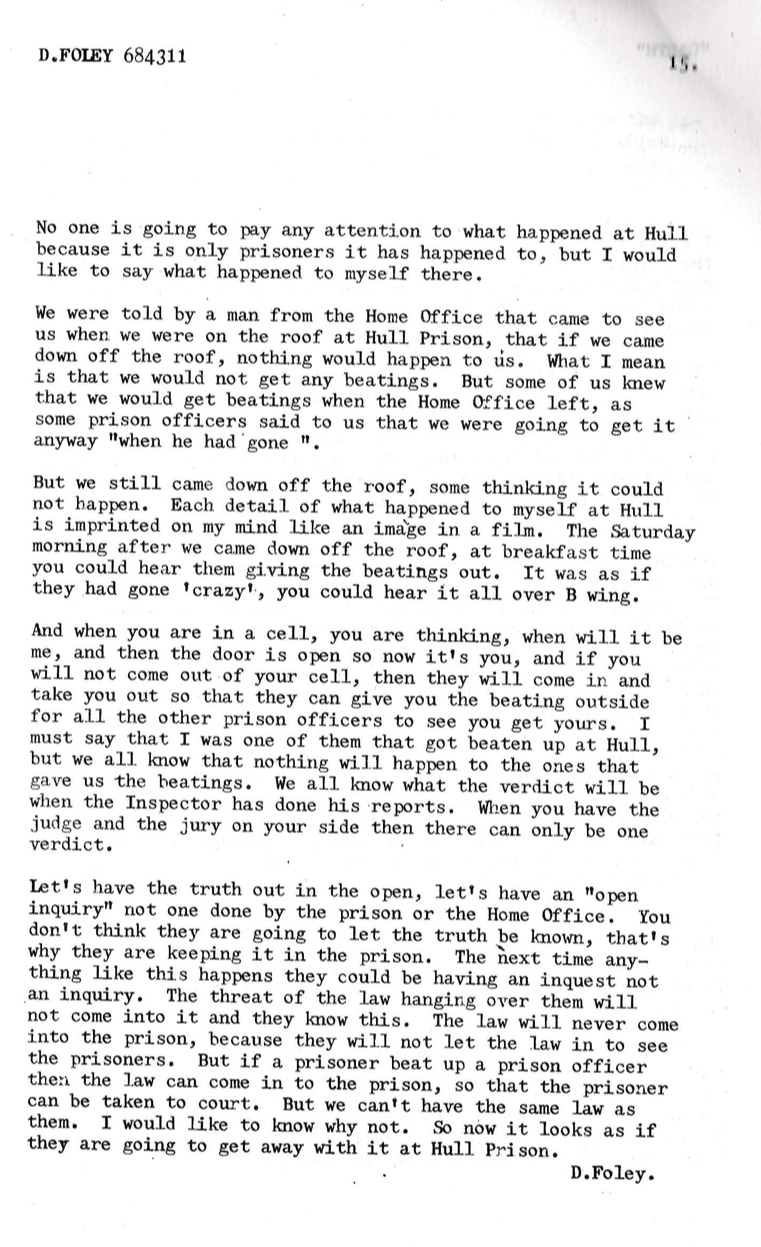
Immigration Raids
How to Set Up an Anti-Raids Group, Haringey Anti-Raids, 2018
Since September 2016, Haringey Antiraids has been organising to challenge immigration raids in our area, as one small step towards a world without borders and prisons, where no one is illegal.
Through weekly street stalls in Seven Sisters, we have built a visible and trusted presence in the area and developed strong links of mutual support with many local migrant groups. We believe not only that this work could be easily replicated across the country, but that it is desperately needed. This is why we have created this zine, to share the lessons we have learned through 18 months of local organising in the hope of seeding similar groups elsewhere.
How to spot an immigration raid
How do they arrive?
Vans marked IMMIGRATION ENFORCEMENT, sometimes unmarked white/blue/black vans accompanied by police car.
What do they look like?
Should be wearing ICE insignia/numbers on shoulders. They often hide them.
Where do they go?
Streets, train & tube stations. Buses, workplaces, homes.
How do they act?
Arrive in groups, sometimes with plain clothes officers. Often block entrances/exits.
How can you help ?
If you see someone being stopped by ICE officers or police on immigration grounds, and your immigration status does not put you at risk, we recommend you:
1. Immediately make the person aware they do not have to answer questions & they can leave
2. Remind the officers of the law.
3. Film the incident, where possible asking the person stopped if that's OK, or just film the officers involved. This may be useful in making a claim in the event of an unlawful stop or arrest.
4. Record lapel numbers of officers involved.
5. Make other members of the public aware of what's happening.
6. Get witnesses' contact details if the stop leads to an arrest or the person wants to pursue it afterwards.
7. Attempt to pass on a phone number to the individual if you think the stop will lead to arrest.
8. Do not get aggressive or physically obstruct officers if you want to avoid arrest for obstruction.
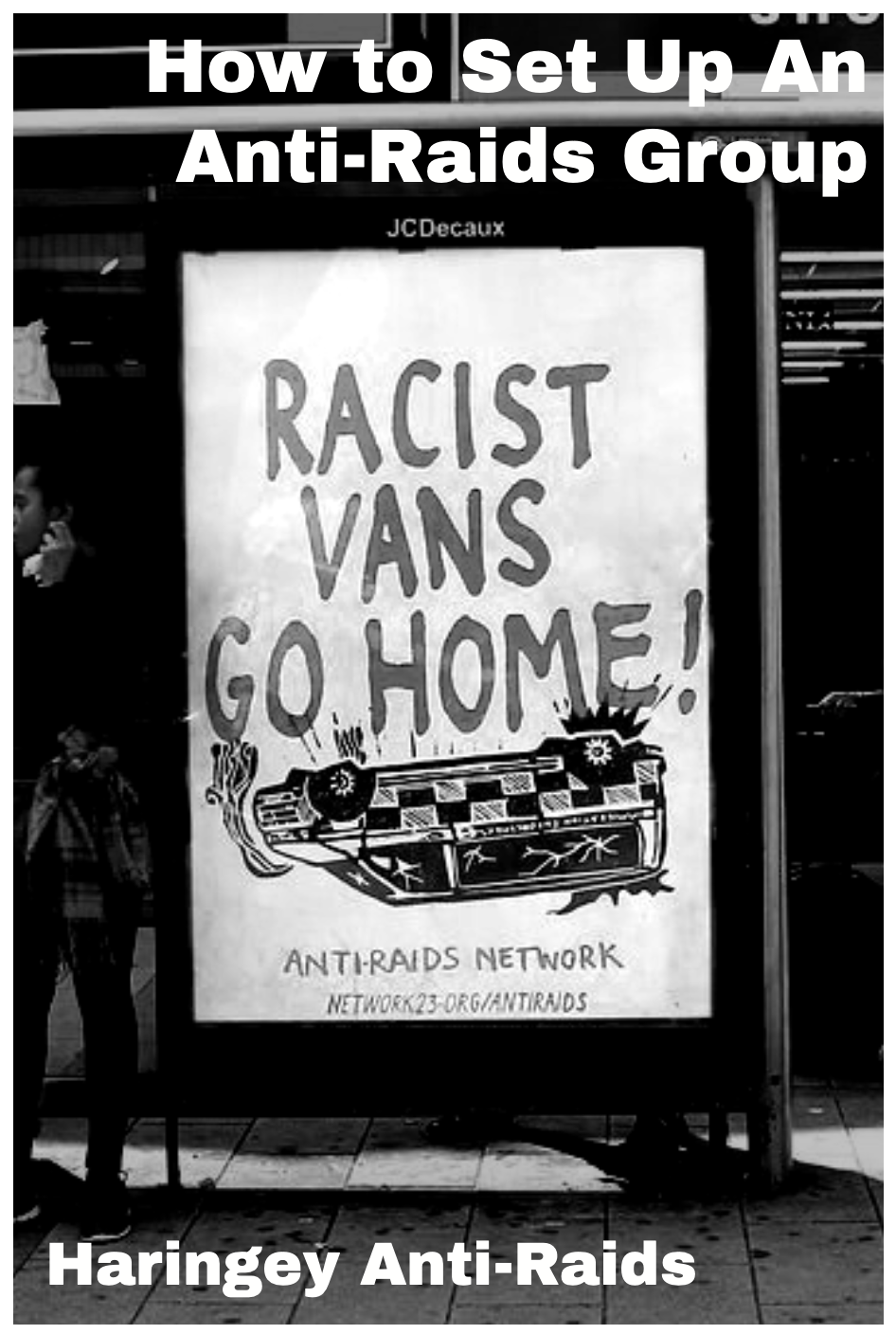
Justice
Excerpt from The Great Incarcerator, part 2: The Shadow of Lucasville, 2013
A prosecutor can go to an inmate and say if you testify in a way that puts Hasan at the center of this crime, I can make sure you don't get charged with any other crime like capital murder.
And in fact if I as defense counsel pay a witness for his testimony I can be prosecuted ...
... I would go to jail, they would take my license and I would be arrested for obstruction of justice.
NEPA News Vol.2 No. 8, September 1974: From Bro. Thomas
Violence is born from oppression. In order to remove violence from society, one must first remove oppression.
To speak of Justice: Justice is not something abstract, but is something very real, very practical. Where there is no justice, there is no peace. It is indispensable in maintaining a sound society.
Justice should not have many faces. There should not be many justices for different people, but one justice for all, regardless of race, creed or color.
Nor should justice be like the blue in the sky, something in which no matter how high you ascend into it you will never find that blue because it is an optical illusion.
Will we receive justice in the Buffalo County Hall? In looking at the conditions before the Attica Massacre, during the Attica massacre and after the Attica Massacre -- I doubt it! The records show that almost all of our motions have been denied in court; the Governor has spent millions to make us his scapegoat. Yes, they want to place their sins on our heads and then send us off into the wilderness (prison). They are not concerned with justice, their scheme is revenge and repression.
Our lawyers have run from state courts to federal courts seeking justice for the Attica Brothers, but this is like running from the wolf to the Fox. The wolf overtly rips us off, but the Fox is a little more refined in that he (Federal Courts) denies us justice with prolonged deliberation. This is the difference between the two courts. The courts are being used as a tool of repression.

Excerpt from The Great Incarcerator, part 2: The Shadow of Lucasville, 2013
It's always framed as "you will tell the truth" - but what's the truth? Who gets to decide what the truth is as part of the deal? And the answer is the prosecutor gets to decide.
Mariame Kaba
The Abolitionist No. 29, Summer 2018: Learning Together How to Fight, Mariame Kaba
I think it’s essential for people to learn together in order to be able to understand what we’re up against. I think that precision in our analysis is going to actually allow us to be much more successful than emphasizing what we are actually trying to dismantle—and, more importantly, not knowing what we’re trying to build. I don’t think you can work on your own. There’s definitely no way to dismantle the systems that we’re trying to dismantle on our own. That’s first and foremost.
I think we learn together how to fight. Part of that is to learn together, literally, in settings where we can argue things out, where we can debate, where we can struggle over big ideas together. I’ve found over the years that sometimes that’s seen by people as a form of elitism and a form of being removed from the “real work” that needs to happen. For me that is the real work that needs to happen, because in building those relationships, in sharing our ideas, we become stronger.
What we have right now is a very weak set of actors on the left who aren’t going to be able to withstand the forces of the state that are already marshaled on a regular basis to crush us. I think we have to know what we’re facing.
That’s a big part of what I try to do in calling people in, both to think about big ideas and also to think about history. Not because I think that history repeats itself; I don’t believe that, and I also don’t believe that just knowing your history is enough. I don’t want history to be a constraint on action; I want it to be a guide that helps us to find our bearings and develop a common language for how we’re going to fight.
That’s why I care about political education; that’s why I care about creating curricula and teaching and learning together.
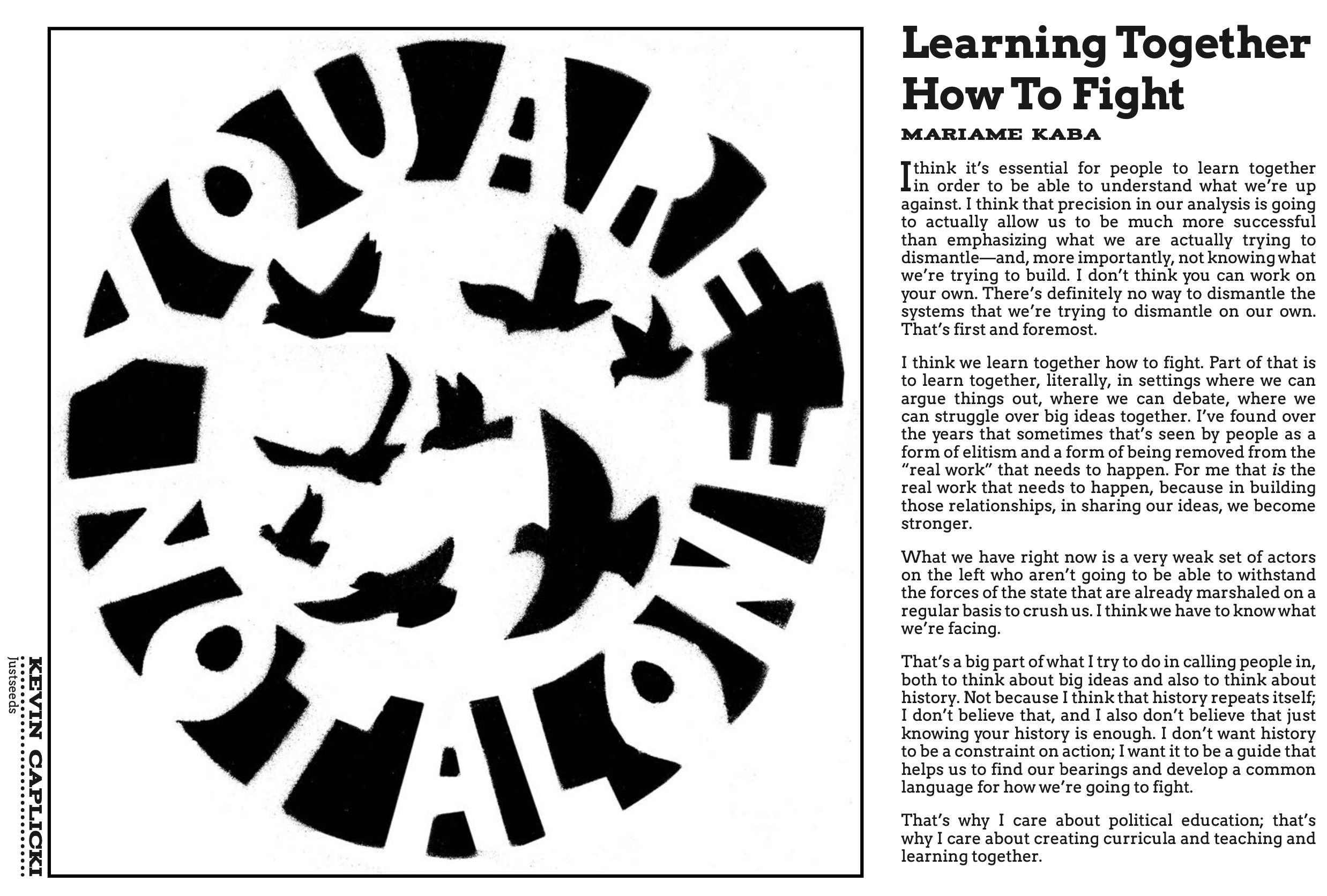
Letters
Excerpt from Attica, 1974
Every time you get a letter, it's opened, it's censored. If they think you aren't supposed to get it, they cut it, like quite a few of my letters I get. They be all cut up. If they don't cut the stuff out of the letter, they erase it.
NEPA News Vol. 1 No. 3, December 1973: Letter To The Editor, George Margolis
To the Editor:
I deplore the barriers erected against communication between prisoners and those on the other side of the bars. An example: On the 25th anniversary of Hiroshima Day (Aug. 6, 1972) eleven inmates at the Federal Corrections Institute, Danbury, Conn. went on a hunger strike in protest against the U.S. war in Indochina. Somehow this act surfaced in the news media. Seeking to encourage the Danbury Eleven I wrote each a letter of support.
I learned later that the prisoners had been transferred to a midwestern prison. I question the legality of a postal service which refuses to deliver or forward mail. I wonder whose rights are being violated - Those of the writer, the recipient, or both?
Very truly yours,
George Margolis, M.D.
Hanover, N.H.

Excerpt from Strangeways, 1980
When I get out, my intentions is to get married to this girl, she's got my - Kitty - she's still by me. She writes to me regularly, and if she didn't, I think I would have cracked up long ago. That's the only thing I live for in jail, my letters and my VOs, they count a lot. That's why I'm scared of losing remission.
Madness
Excerpt from Strangeways, 1980Like I said, I killed this guy, but doctors, psychiatrists don't know how you really feel. They try, they try and help you. They're trying to help me, with my alcoholism and killing a guy. Depression, I've suffered with that. But once that door's banged up on me, I'm opened at seven in the morning and it's banged at eight o'clock at night. They don't know how I feel, they don't know how I sleep, how I wake up, still, with sweat. I've never forgot the day, I did that to that man. Never. There's not a day goes by. The nighttime. The daytime you're busy, you're occupied in your mind. The nighttime you're alone, you're in your cell, you're writing a letter, you're listening to a radio. Things come into your mind. [...]
Anarchist Black Cross Bulletin No. 5, 1993: We're Not Mad, We're Angry
In general, mental hospitals are part of the state apparatus for keeping control over 'dangerous' elements in society. Many of those imprisoned in maximum security hospitals have come from the prison system and are often stroppy individuals who fall foul of the prison authorities or those who have 'mental problems' diagnosed after being locked up.
[...]
Of course, with many people, supposed mental illnesses come about due to the stresses of our lifestyles whereby we are pushed to the limits according to the needs of capital and the rich. Deprivations, abuse, stress, can all lead to depression and break downs. However, psychiatry ignores this and tries to place the emphasis on "genetic defects." People who refuse to fit into stereotypical roles are also pressurised and often sectioned.
[...]
The mental health system is used to maintain the class system and it uses every method including racism and outright murder to control those forced into it. [...] In the end we have to protect our own against the true 'madness' of a system that oppresses and exploits us, and then locks us up and kills us.
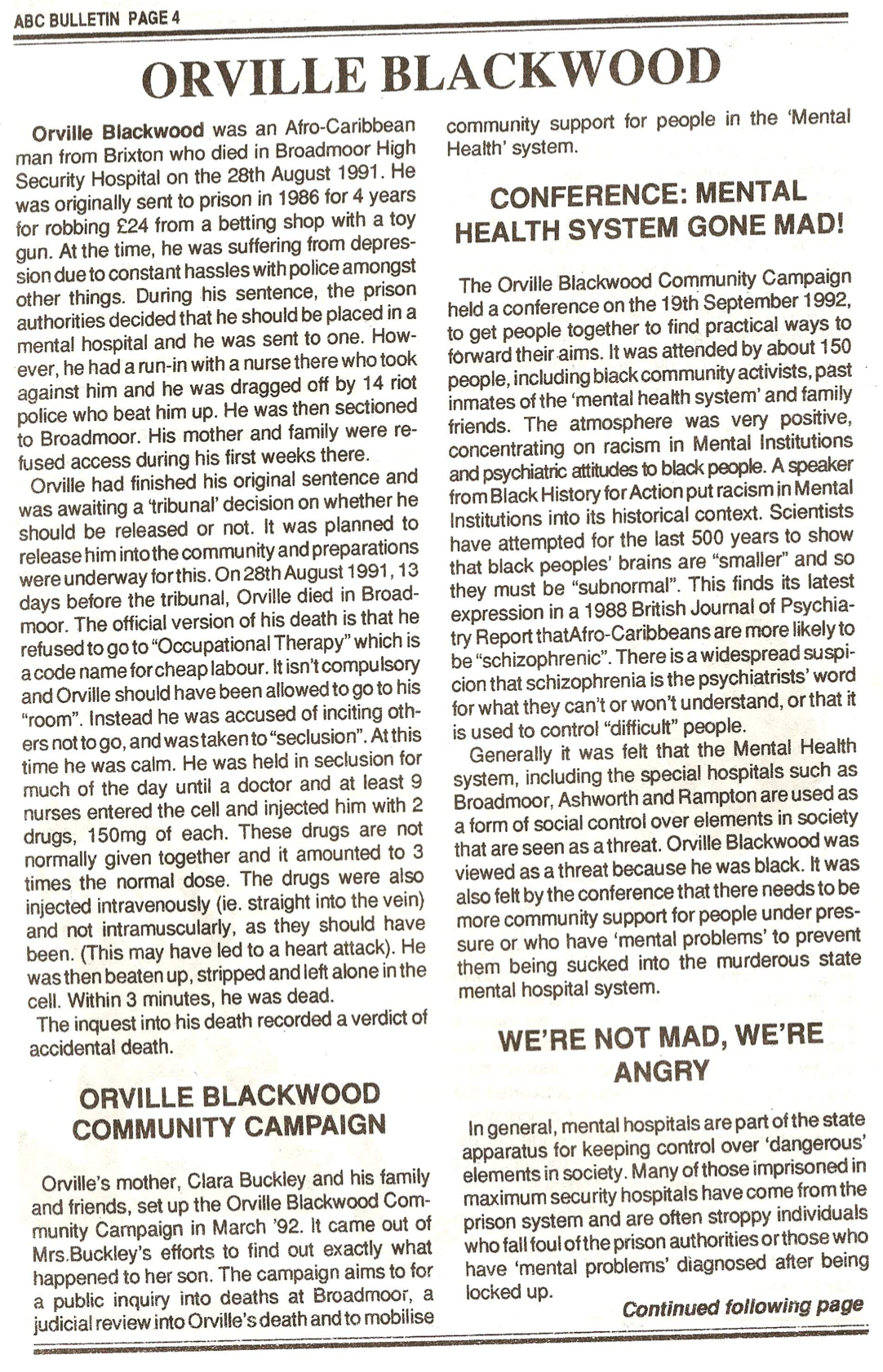
The Newham Monitoring Project
Excerpt from Thames News, September 17, 1987
"Living in Terror" is the name of the report and the Commision for Racial Equality say that's a reality for many racial minorities in London. The report says that attacks and abuse are on the increase, the worse area: Newham. The East London has a racial mix of Asian and West Indies communities, the Commision say they are at constant risk of attack, and it's estimated there's one every hour in the borough.
The Dividing Line - Newham Monitoring Project's Open Space Film, 1986: The Newham 8 Case
In response to a continuing number of racist attacks in and around Little Ilford School, and because no concern was being shown by the school authorities and the police, Asian youth - following strong local rumours of an imminent, major attack on Asian schoolchildren on Friday September 24th 1982 - gathered at the school to escort younger school - children back home.
Eye witnesses confirmed that plain-clothed police officers, who did not declare their identity, racially abused the eight youths and proceeded to assault them. This led to a series of incidents and the charging of the eight with offences ranging from threatening behaviour to Actual Bodily Harm, and also conspiracy - later dropped in favour of affray.
At the trial four of the eight were acquitted of all charges. The other four were found 'guilty' on the affray charge, although acquitted of the other charges. Their 'guilty' verdict, however, did not mean a defeat for the right to self-defence. The prosecution's decision not to proceed with the conspiracy charges and their failure to secure a single conviction on the charges of possessing offensive weapons, and assaults occasioning ABH, vindicate the defendants' assertion of their rights to go on the streets, armed if necessary, in defence of their community and themselves from attack. [...]
Judge Lymberry, presiding over the trial, made a plea for reconciliation. He commented on "irresponsible elements in Newham who are bent on attacks of a racial nature." The Newham 8's response to the Judge's plea, that "reconciliation has to come from the police," was based on a long history of lack of police response to racist attacks and the lack of police accountability.
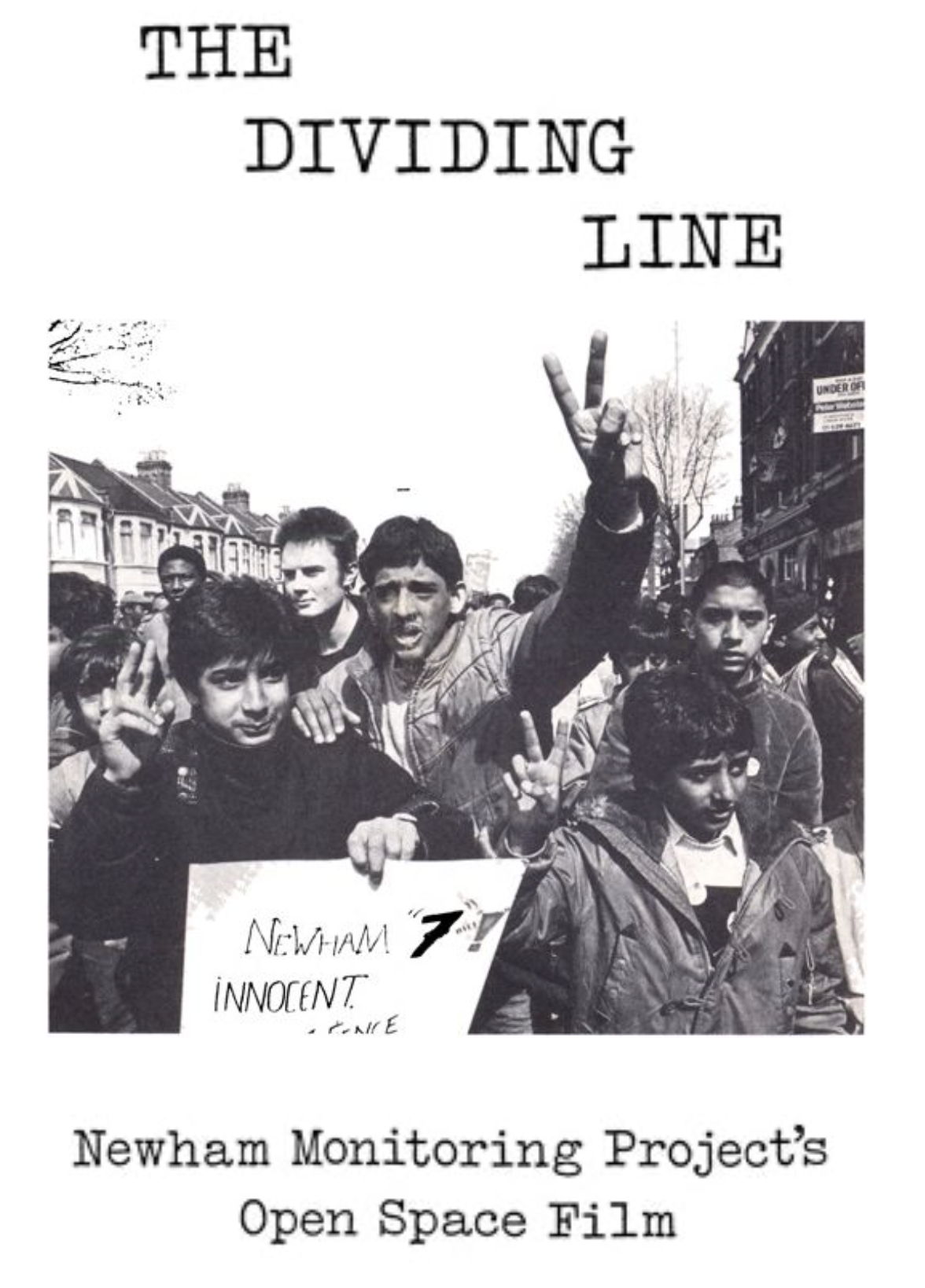
Excerpt from Thames News, September 17, 1987
Institutions, especially the police, have not just got to come out with words but they have to start actually doing something in practice because if they don't do that then people in certain areas like Newham who are under attack are organising in their own defense and will defend themselves and that is the whole history of communities like Newham."
Outside
Here are 10 things they can do for us:
[...]
2. Don’t speak for us. We can speak. When we cannot, due to repression or threats from prison officials, use your freedom and privilege to amplify our voices and advance our issues.
[...]
5. Remember, we don’t have Internet access. The latest news is not just a click away for us. Create offline publications (newsletters, magazines, journals, letters) to keep us informed and educated. Provide platforms for our voices.
[...]
7. Financially support activists behind the walls. Everything costs money in prison. If inside activists' views and ideas are to be included, if our experiences are to be centered, you have to support our efforts at studying, organizing and communicating with you.
8. Learn what really happens in here. Don’t assume. Oftentimes, reforms are pushed, and their ultimate results adversely affect prisoners. The PIC is adept at morphing demands for reform into measures that further oppress prisoners. Before and after campaigns and initiatives, solicit the views and experiences of prisoners.
9. Join us in advancing issues that truly create safe communities. For example: increased school funding, community mental health clinics, universal health insurance, living wages, community substance and alcohol treatment programs, transformative justice programs, decarceration and decriminalization efforts. This way, when we are released we’ll have less chance of returning to prison.
10. Take care of yourselves. We need you. This fight is for the long term. We need you struggling alongside us and our families for the duration. Create and find joy in the struggle. Find time and space to rejuvenate and recalibrate. Be good to yourselves. Breathe.
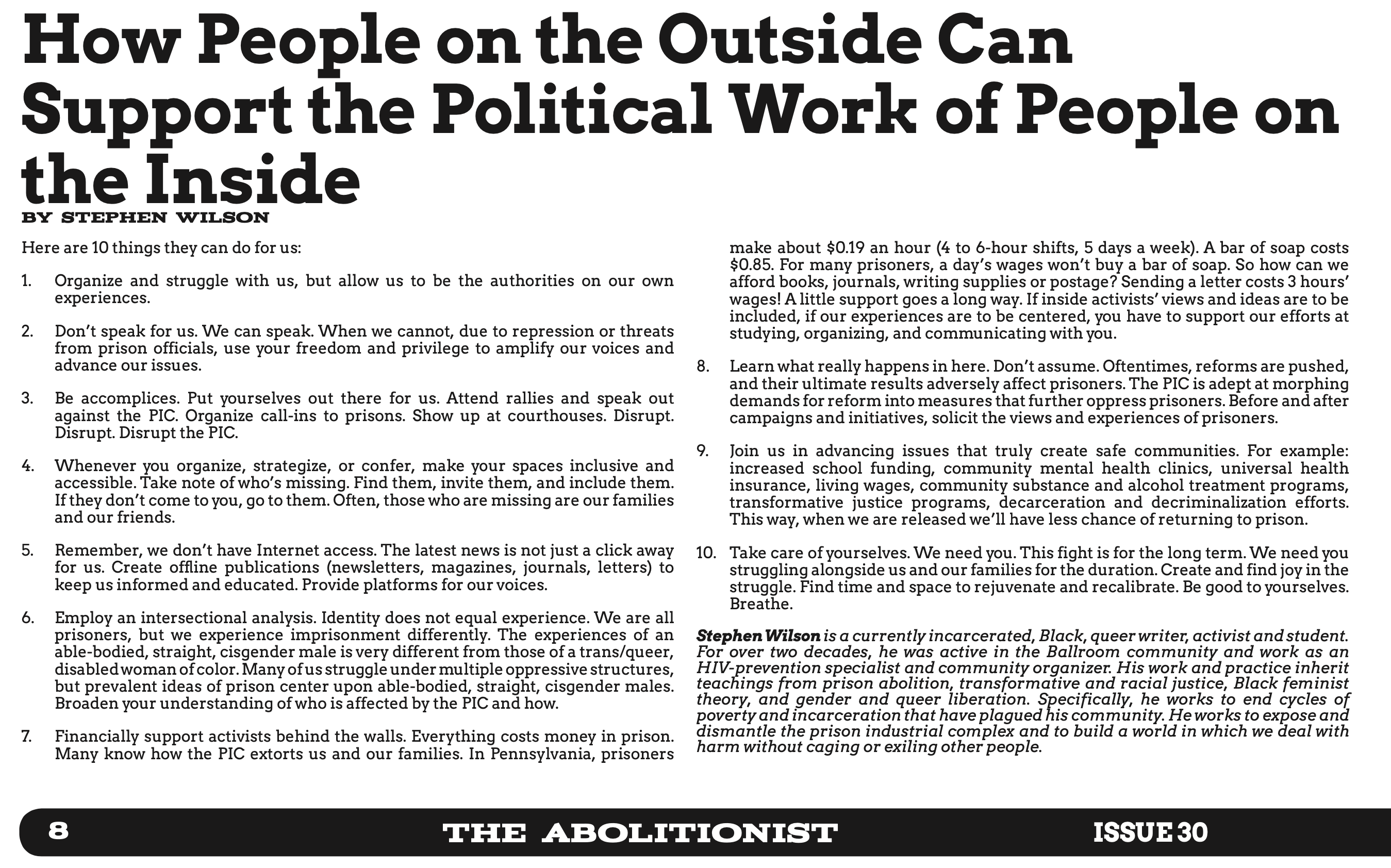
Punishment
Os Cangaceiros No. 2, 1985: Prisoners' Talking Blues, Yves Delhoysie
Nous cherchons surtout à combattre l'idée même de la prison. Nous voulons en venir à la destruction de ces institutions maudites.
---
Above all, we seek to fight against the very concept of prison. We want to arrive at the destruction of these damned institutions.
[...] “They always try to make you participate in your own punishment; this is what the dialogue is, there are no other possible forms of it.” [...]
The people currently responsible for repression seek to provoke and feed an endless pseudo-dialogue about multiple improvements that could be introduced into the prison regime, all in order to justify it. It is an indirect way of convincing the prisoners of the validity of their punishment. The state is convinced that it has a greater chance of managing this by combining pseudo-dialogue with repression, the physical violence of which is no longer enough in itself.
By refusing the very concept of punishment, the imprisoned delinquents start to openly accept what they are in society. The prisoners are aware that a penal code belongs to its time and to a state that corresponds to the current society; the same goes for the penal procedure.
Reformist consciousness is always expressed in the form of justification. On the contrary, the behaviour of the rebels appears unjustifiable. [...] This cannot be negotiated with the state. When prisoners start challenging the justice of which they have been the object, prison ceases to be suffered as a fatality.
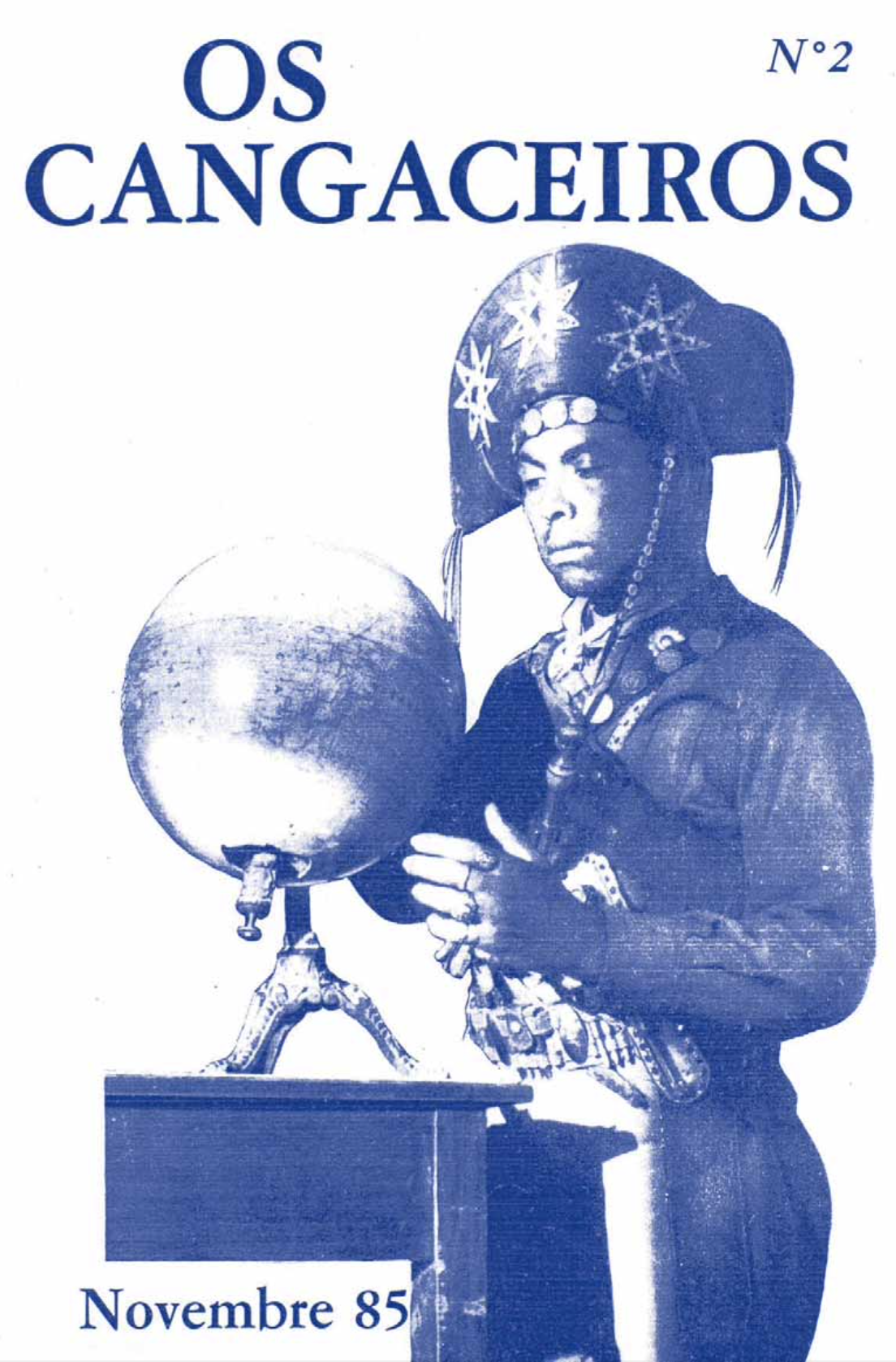
Quotidian
Excerpt from Everyday Practices of Transformative Justice, Mia Mingus, October 13, 2020
I think a lot of harm that happens is, it's like death by a thousand cuts, little cuts. And we often don't pay attention until there's so many little cuts that we're bleeding out, and then we rush to, you know, we rush to the crisis and the emergency and we drop everything. But what if we started rushing and dropping everything when the little cuts happen? Or when there's just maybe four or five little cuts instead of when we're bleeding out?
Boyle Heights Alliance Against Artwashing & Displacement: The Short History of A Long Struggle, 2016
The Boyle Heights Alliance Against Artwashing and Displacement is a coalition born from the complex specificities of Los Angeles. We are new and old friends who find ourselves at the intersection of multiple overlapping struggles. We have come together to confront the current crisis of evictions and abusive real estate practices in L.A., to question the role of culture in gentrification and the narrative of ‘inevitability,’ and to push to stop displacement in its tracks. [...]
WHAT HAPPENS WHEN THE GALLERIES WIN THE CULTURE WAR BY PROMOTING DIVERSE & VIBRANT CHICANO ART – BUT DIRECTLY CONTRIBUTE TO THE DESTRUCTION OF A DIVERSE & VIBRANT NEIGHBORHOOD ? WILL WE JUST WRING OUR HANDS AND SAY, “WELL, I GUESS GENTRIFICATION IS INEVITABLE?” WILL WE FEIGN SURPRISE AND PASS THE BLAME? WHAT WILL WE DO TO STOP THE “INEVITABLE” FROM OCCURRING IN BOYLE HEIGHTS ? [...]
CREATIVITY AND CULTURAL DIVERSITY MAY BE DRIVING CAPITALISM ON THE REPRESENTATIONAL LEVEL, BUT THEY ARE NOT AMELIORATING THE EFFECTS OF ITS VIOLENCE. [...]
Our social system has clearly adapted to pit us all against each other in a war of desperate speculation. But here we are living through the mess. Ignoring the binaries that this harsh system imposes disregards the fact that an eviction notice is often a matter of life and death in Los Angeles. To dismiss the call to act in refusal as “binary” reveals the pervasive discomfort of those with resources and relative security regarding their housing, job opportunities, and access to health care. The structural realities of low-income Angelenos may seem utterly invisible to many in the L.A. art world and to new residents in Los Angeles.[...]
We see this as an historic moment for forging forms of urban resistance and transformative justice. Gentrification is never inevitable. It is the result of actions and policies that can be changed through collective direct action. We challenge everyone, but especially non-profit developers, land-bankers and gallerists to reconsider their collective role in the future of Los Angeles.
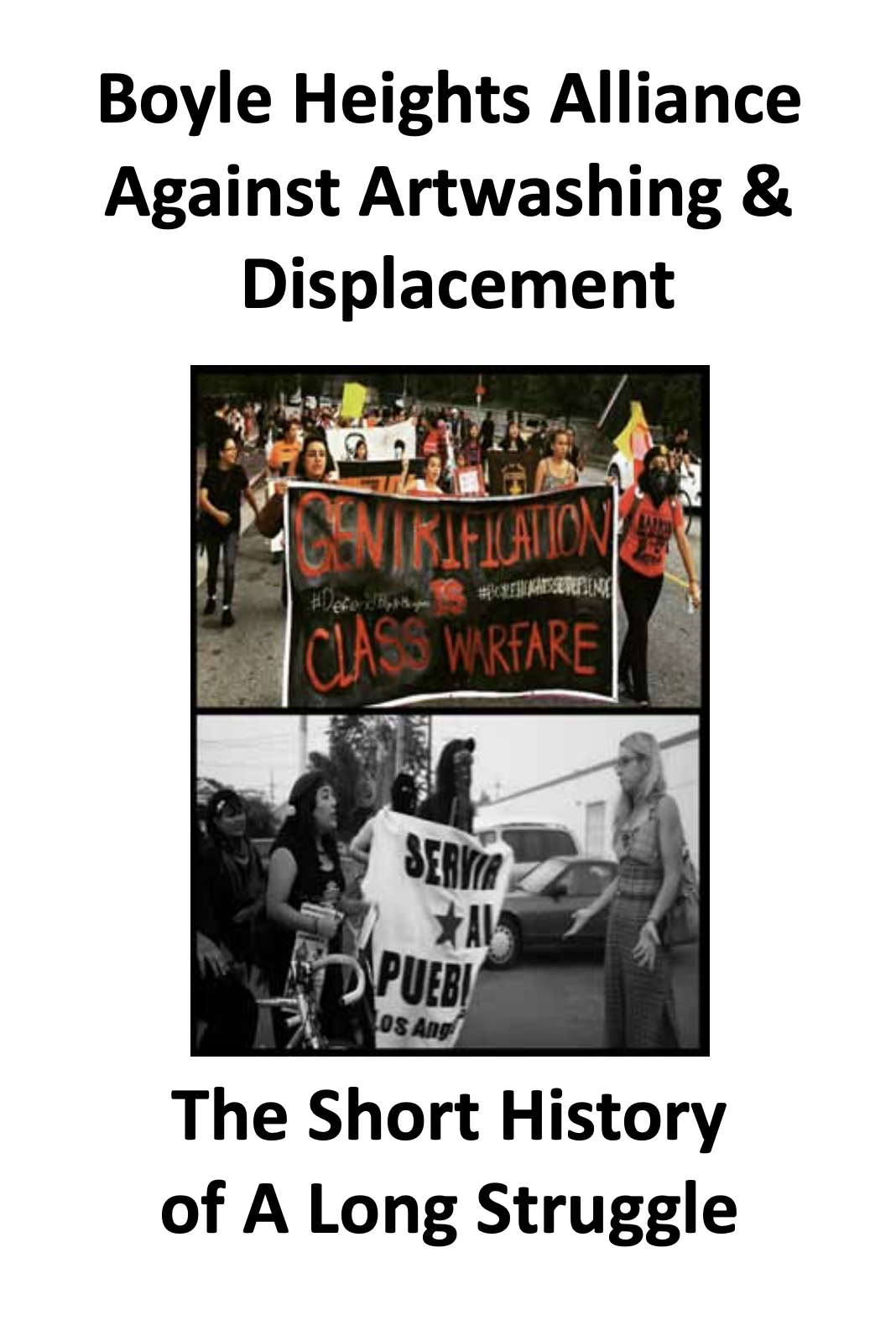
Excerpt from WHAS11: Lawsuit says gentrification efforts led to Breonna Taylor's death, July 7, 2020
Attorneys say they were targeting suspected drug dealer Jamarcus Glover and the other two people who lived in his home in the 2400 block of Elliott Avenue because it was in the way of the city's project. Lawyers claim the city has been using police officers to remove people and homes on Elliott Avenue to make room for a large real-estate development project. That's where Breonna's ex-boyfriend Jamarcus Glover lived. [...]
Restaurants
Abolish Restaurants: a worker's critique of the food service industry, 2006
Your back hurts from standing up for 6, 10 or 14 hours in a row. You reek of seafood and steak spices. You’ve been running back and forth all night. You’re hot. Your clothes are sticking to you with sweat. All sorts of strange thoughts come into your head. You catch bits and pieces of customers’ conversations, while having constantly interrupted ones with your co-workers.
“Oh isn’t it nice, this restaurant gives money to that save-the-wolves charity.”
“I can’t believe she slept with him. What a slut!”
“Yeah, the carpenters are giving us problems. They want more money.”
“So he says to me, ‘I think my escargots are bad,’ and I say ‘What do you expect? They’re snails’ AHAHAHAHAHAHAH.”
No time to worry about relationship problems, or whether you fed your cat this morning, or how you’re going to make rent this month, a new order is up.
[...]
A restaurant is a miserable place.
[...]
Today it’s hard to imagine a world without restaurants. The conditions that create restaurants are everywhere and seem almost natural. We have trouble even thinking how people could feed each other in any other way (besides going to the grocery store of course). But restaurants as much as parliamentary democracy, the state, nationalism, or professional police are an invention of the modern capitalist world.
Some time in the 19th century, the modern restaurant crystallized in the form we know it today, and spread all over the globe. This required several things: businessmen with capital to invest in restaurants, customers who expected to satisfy their need for food on the open market, by buying it, and workers, with no way to live but by working for someone else. As these conditions developed, so did restaurants.
[...]
The workplace is set up not only to produce money for the boss, but also to produce restaurant workers who are isolated from each other, in competition with each other, prejudiced against each other, afraid for our jobs, and who only look for individual solutions to our problems. But this is only an ideal towards which management aspires. [...] If we are strong, we can make the work a lot less miserable. When the boss isn’t looking, the cooks will make food for the front-end staff, and they will steal drinks from the kitchen. We’ll warn each other when the boss or the manager is coming around, and make fun of them when they’re gone.
[...]
Our struggle against restaurant work is also a struggle against the way the work is set up— against the division of labor and the hierarchy at work.
[...]
The desire to destroy restaurants becomes the desire to destroy the conditions that create restaurants.
[...]
We aren’t just fighting for representation in or control over the production process. Our fight isn’t against the act of chopping vegetables or washing dishes or pouring beer or even serving food to other people. It is with the way all these acts are brought together in a restaurant, separated from other acts, become part of the economy, and are used to expand capital. The starting and ending point of this process is a society of capitalists and people forced to work for them. We want an end to this. We want to destroy the production process, as something outside and against us. We’re fighting for a world where our productive activity fulfills a need and is an expression of our lives, not forced on us in exchange for a wage—a world where we produce for each other directly and not in order to sell to each other. The struggle of restaurant workers is ultimately for a world without restaurants or workers.
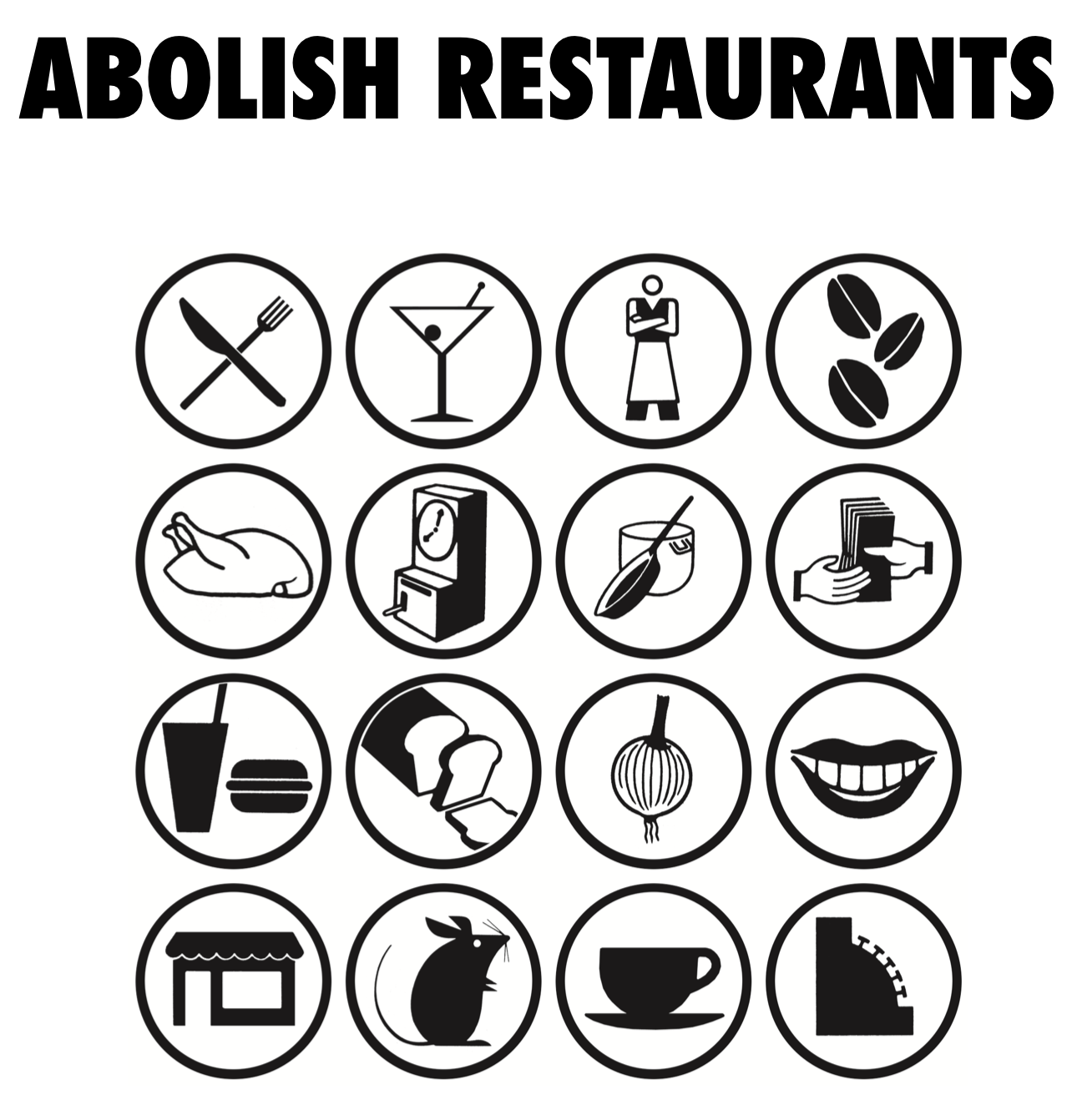
Song
Like Penitentiary Blues, which portrayed Parchman as a brutal catastrophe, Eva White’s song No Mo’ Freedom emphasizes the brutal emotional toll of imprisonment at Parchman as well as a refusal to concede to its disciplinary will:
When those jurors found me guilty
That old mean old clerk he wrote it down
I could tell by that paper that I was Parchman bound
No Mo’ Freedom No Mo’ good times
In this wide, wide world for me
Oh I’m beat for my freedom and I’m sick as I can be
But some day, yes someday Some day I will go free
I’m gon’ treat all you people just like you treated me
White’s lament conveys the emotional devastation of incarceration in a way that is unyielding, refuses sanitization, and does not promise forgiveness to those who treated her horribly. In this way she rejects the mandate of rehabilitation; she is not the problem and she will not be reformed or transformed into a docile girl who accepts white supremacy and sexism when she is out. No, the sickening emotional violence of imprisonment has instilled justifiable anger, which will not be suppressed in the someday of her freedom. Black women’s blues refused the narrative of criminalization, which sought, as Gilmore has argued, to “individualize disorder.” Instead, they told histories of hostile juries and racial terror. For example, in Dangerous Blues, Mattie Mae Thomas connected the scorn that women “who won’t cook no breakfast” and “won’t wash no clothes” faced on the outside to gendered racial terror on the inside:
Said Mattie had a baby and he got blue eyes,
Said must be the captain, keep on hangin’ around.
Under the conditions of sexism and white supremacy that transcended prison walls she told her audience, “I may get better but I won’t get well.” The expectation of docility and the demand that imprisoned people be contrite and content pervades the legal system, manifesting in parole hearings, sentencing hearings, and upon release. Eva White and Thomas refuse to concede to these oppressive expectations when they vow to treat others as they were treated and explain that they will never get “well.”
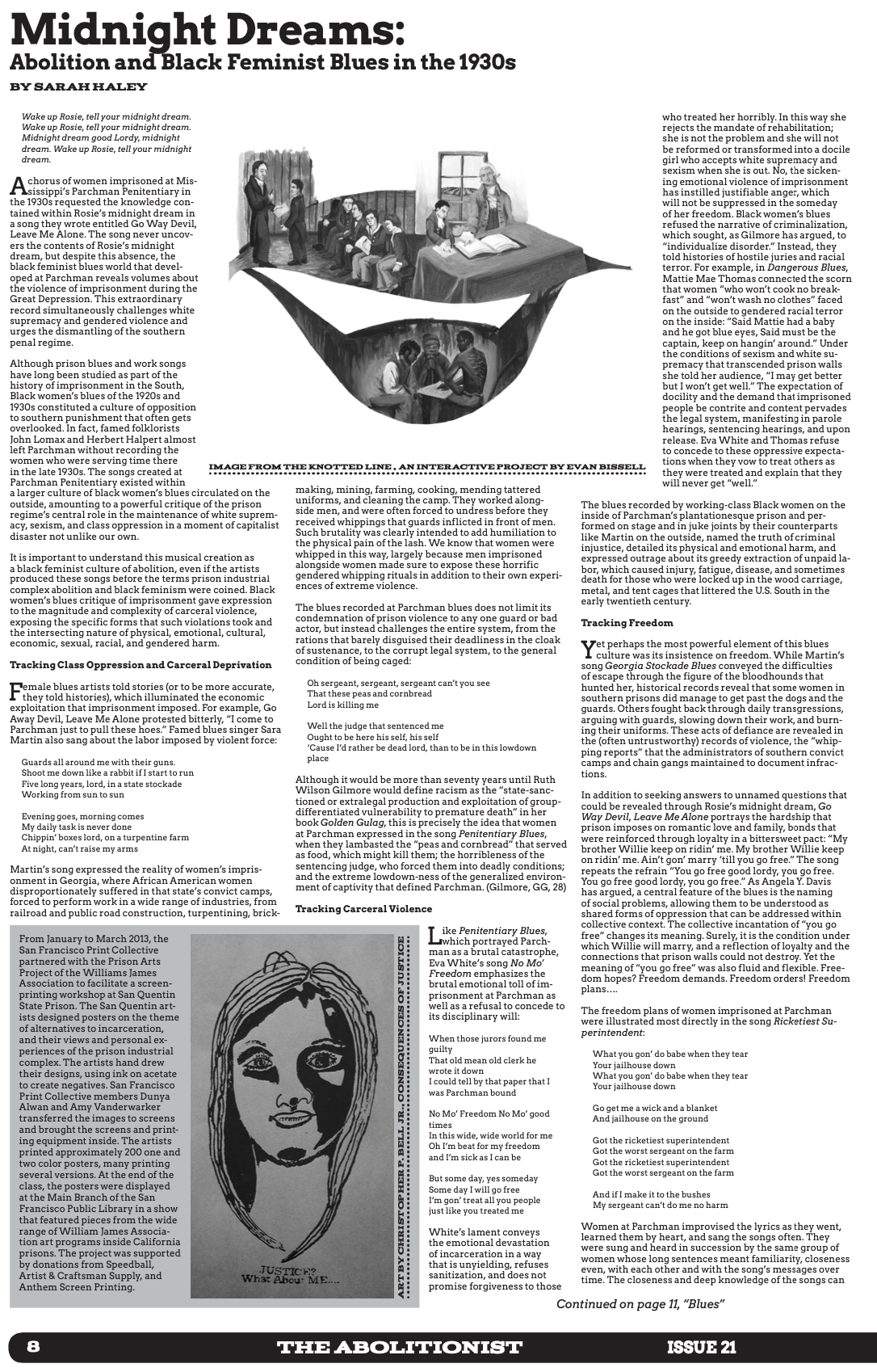
Excerpt from No Mo' Freedom, Mattie Mae Thomas, 1934-1947
Time
NEPA News Vol.1 No.1, October 1973: TIME, from a Connecticut captive
Time is the lack of freedom; time is eight-hundred faceless mannequins; time is the same menu every fourth week; time is eight-thousand, two-hundred and fifty-six paces around the recreational area; time is grey and drab; time is countless conversations, all completely meaningless, without purpose or direction; time is someday but never really is; time is without true laughter; time is boredom bordering upon insanity; time is unreality; time is timeless; time is man's invention; time is a four letter word; time.

NEPA News Vol.2 No.3, March 1974, 1974: TIME
Clang slam
screech bam
steel on steel
brick an' blocks
brim with hate
clenched fist
loud mouth
no care
bad fare
manner: unknown
pick to the bone
poke, punch
stab pinch
do your time
it's a cinch
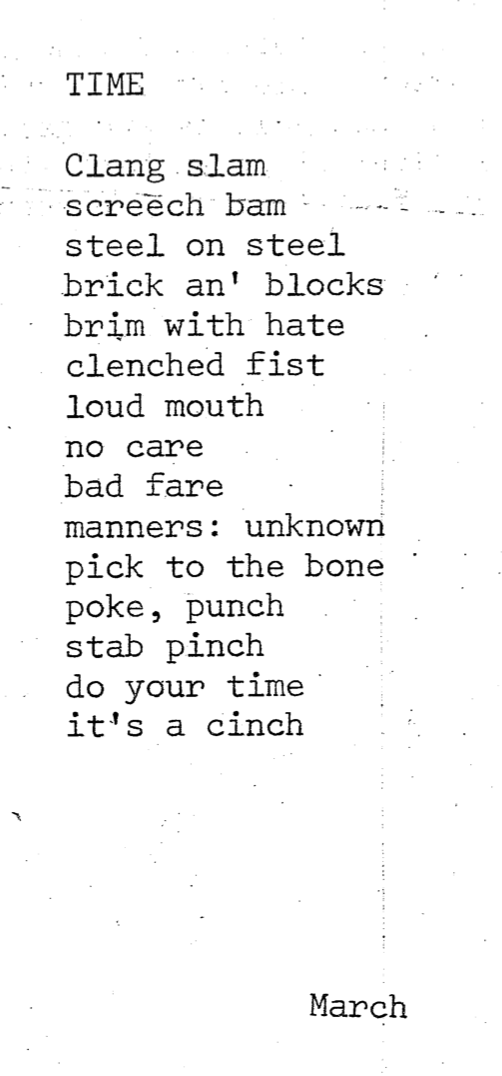
Uprising
Excerpt from The Great Incarcerator, part 2: The Shadow of Lucasville, 2013
My name is Jason Robb, and I am one of the Lucasville Five, and I've been locked in isolation in the Ohio SHU unit, since 1993. At the present time, I'm sitting here with a death sentence, that the state conspired to manufacture for two years before bringing down upon me the weight of the full resources of the state of Ohio.
Lucasville: The Untold Story of a Prison Uprising, 2011: Foreward, Mumia Abu-Jamal
The name is evocative. People who hear it, who may know very little about its recent role in Ohio history, seem to recognize its penal roots.
It has become a site etched upon the American mind that means prison, like Sing Sing, Marion, or Lewisburg.
The name evokes an aura of fear, of foreboding, of something strangely sinister.
That this exists is a testament to how the state has set aside sites of invisibility; where people know, in fact, very little of substance; yet know enough to know that this is something to be feared.
Yet, Lucasville exists simply because millions of people, like you, the reader, allow it to exist. It exists in your name.
Amid the silence that greets its mention, is the silence of ignorance, an ignorance that serves the interest of the state, but not of the people.
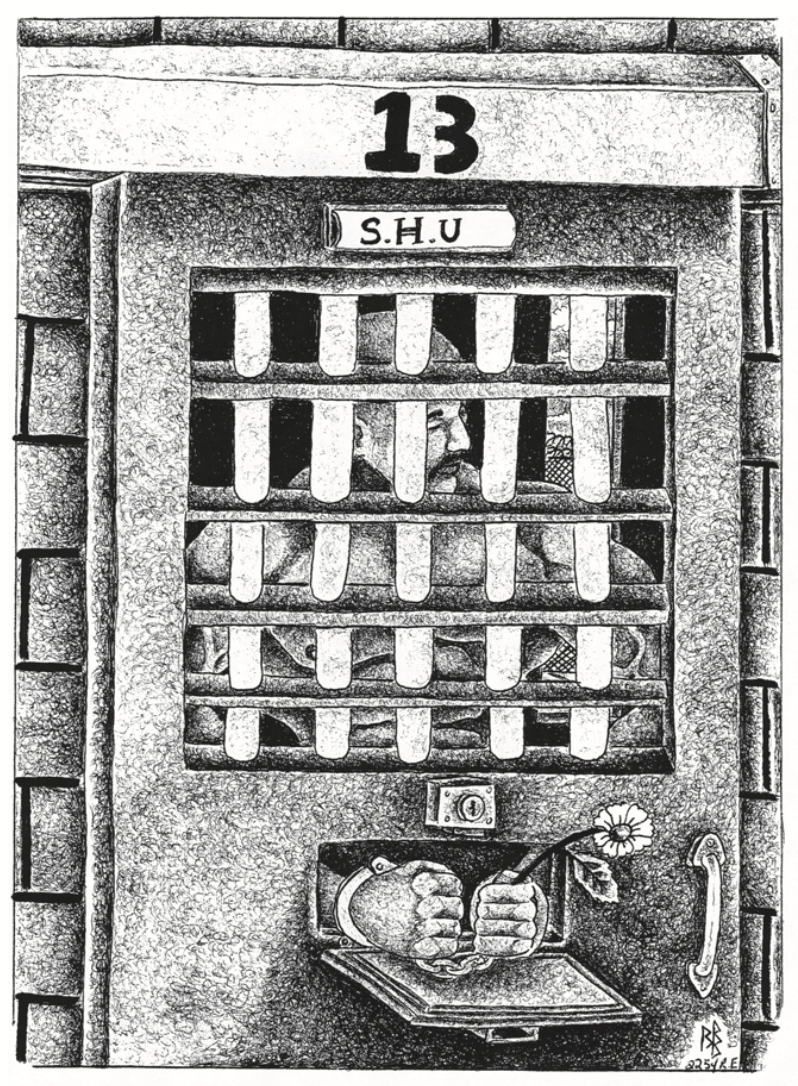
Excerpt from The Great Incarcerator, part 2: The Shadow of Lucasville, 2013
These men should not be on death row, these men should not be a solitary confinement. They should be hailed as as heroes, because they were the negotiators in the uprising. They prevented more deaths...
Violence
Os Cangaceiros No. 2, 1985: We, the Cangaceiros, Yves Delhoysie, Georges Lapierre, Louise Rivière
Nous parlons beaucoup de la violence dans les banlieues. Toutefois nous ne pensons pas qu'il n'y ait que là qu'il se passe quelque choses. Seulement, beaucoup de nos semblables y vivent, et souvent nous-mêmes. Nous ne faisons pas que parler de la violence : c'est notre élément, et même peut-on dire, notre lot quotidien. La violence est d'abord celle des conditions qui nous sont faites, celle des gens qui les défendent et plus rarement, hélas, celle que nous leur renvoyons à la gueule. Nous ne connaissons pas tous nos ennemis, mai on connaît ce qu'ils défendent. Tous nos alliés ne sont pas forcément nos complices. Il arrive qu'ils le soient. Nous ne sommes pas en rapport avec tous nos alliés. Les chômeurs qui combattent l'indigence sont autant nos alliés que les travailleurs qui se révoltent contre le travail et échappent au contrôle des syndicats. Nous ne pensons pas détenir une vérité universelle, mais la communiquer. Les vérités universelles sont celles qui se communiquent, pas celles que l'on détient. À ceux qui se demandent si nous sommes assembléistes, conseillistes, nous répondons que ce qui nous importe c'est de savoir comment les gens établissent et organisent le dialogue. Nous ne sommes pas des terroristes parce que nous tenons à la clandestinité : « creuse, vielle taupe », disait-on jadis. À notre époque, les gens qui affirment des exigences révolutionnaires passent pour des rêveurs. Mais l'homme est fait de la même matière dont sont faits ses rêves. Nous sommes révolutionnaires. Os Cangaceiros veut dire : « Tout est possible », « Nous sommes ne guerres », « Rien n'est vrai tout est permis ». Nous sommes nombreux, par rapport à l'atomisation régnante. On a beaucoup d'alliés de par le monde.
---
>We speak a lot about the violence in the suburbs. However, there is no need to think that this is the only place in which anything is going on. It’s just that many people who share our conditions live there, as we do ourselves at times. We speak of nothing but violence. It is our element, and we could even say, our daily destiny. Violence is first of all what constitutes the conditions that are imposed on us. Then there is the violence of the police who defend these conditions. And then, unfortunately less common, there is the violence that we throw back in their faces. We don’t know all of our enemies, but we know what they defend. [...] We are not “terrorists” because we support underground activity. We are revolutionaries. [...] “Os Cangaceiros” means “Everything is possible”, “We are at war,” “Nothing is true, everything is permitted.” Relative to the reigning atomization, we are numerous, and we have allies everywhere.

Excerpt from Strangeways, 1980
The place wants closing down – I don't know about Risley being closed down – this place should be closed down because this nick is run by the screws because there's not a con in here got any bottle ... there's none of them have got any bottle, they're all doing – they mix them up 6 weekers with 3 weekers, they don't put all of them together, because if they put all of 'em together, this place would've gone off years ago. But I tell you something, this place will go off and when this place does go off the roof will go man, I'm telling ya, because they've not had a riot here for a long, long time – Risley they're having riots every so often – but when this place goes off it'll go off because the tension in the men in here man, it's unbelievable.
Whiteness
Race Traitor No.1, Winter 1993: Editorial: Abolish the white race - by any means necessary
The white race is a historically constructed social formation - historically constructed because (like royalty) it is a product of some people's responses to historical circumstances; a social formation because it is a fact of society corresponding to no classification recognized by natural science.
The white race cuts across ethnic and class lines. It is not coextensive with that portion of the population of European descent, since many of those classified as "colored" can trace some of their ancestry to Europe, while African, Asian, or American Indian blood flows through the veins of many considered white. Nor does membership in the white race imply wealth, since there are plenty of poor whites, as well as some people of wealth and comfort who are not white.
The white race consists of those who partake of the privileges of the white skin in this society. Its most wretched members share, in certain respects, a status higher than that of the most exalted persons excluded from it, in return for which they give their support to the system that degrades them.
The key to solving the social problems of our age is to abolish the white race. Until that task is accomplished, there can be no universal reform, and even partial reform will prove elusive, because white influence permeates every issue in US society, whether domestic or foreign. [...] so long as the white race exists, all movements against racism are doomed to fail.
Race Traitor aims to serve as an intellectual center for those seeking to abolish the white race.
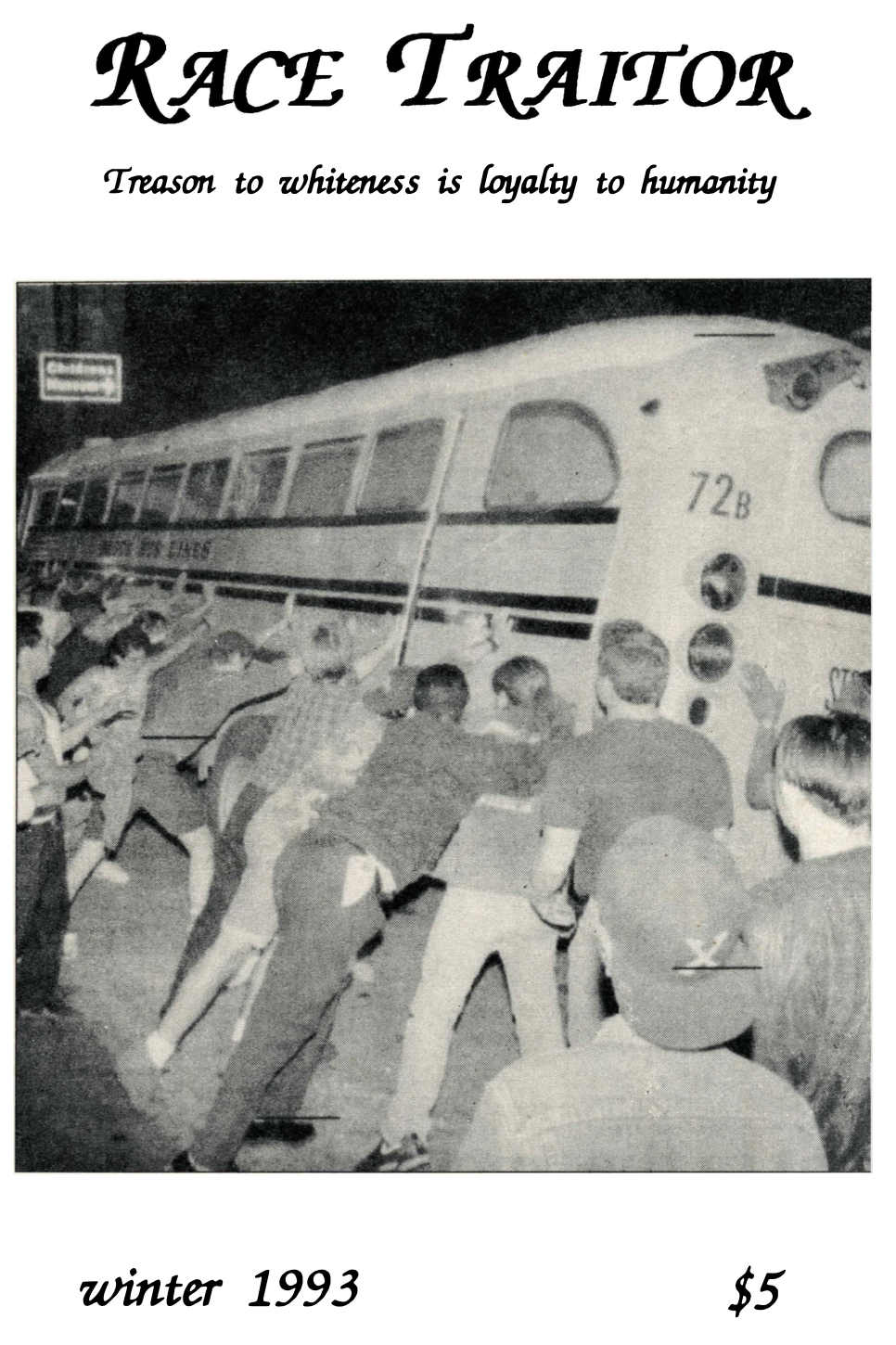
Xenophobia
Variant Vol. 2 No. 25, Spring 2006: They all belong to Glasgow
From a conversation in early January with Ahmed Khan, who has been peacefully protesting the dawn raids and forced removals of asylum claimants in Glasgow.
I’m a consultant psychiatrist. I’ve been doing the solitary protest at Glasgow’s Brand Street immigration removal centre since June 2005, when I was the only one there. There are now groups protesting, especially on a Saturday, although I’m not a member or affiliate of anything.
The Home Office building at Festival Court on Brand Street, Ibrox is where asylum seekers are forced to sign on every week with their family, and whenever else they’re called. They only get 70% of the minimum social security. It’s where the immigration snatch squad is based that conducts dawn raids on asylum families, forcibly removing them from their homes. When the families walk in to Brand Street to report they are very, very scared as they don’t know if they’re coming out again. People go in to sign on and some leave handcuffed in a van, taken to one of the immigrant prisons like Dungavel or Yarls Wood, before being deported. It’s very unpredictable but the families have been saying that if they know there are people outside supporting them it makes them feel better. When you go to Brand Street, especially on a Saturday, you see families with children, toddlers, babies forced to queue up from early in the morning to report. If the general public were made to stand outside and see this they wouldn't tolerate it. They wouldn't be able to live with it.
[...] The authorities are so upset about the weekly Saturday protests that they’re telling families not to come to report on that day any more. The trade union for immigration staff in Brand Street (Public and Commercial Services Union) are panicking, apparently Glasgow has become the most difficult city in the UK for the immigration department to work in. [...] Now there’s lots of us and we’re causing them to run scared.
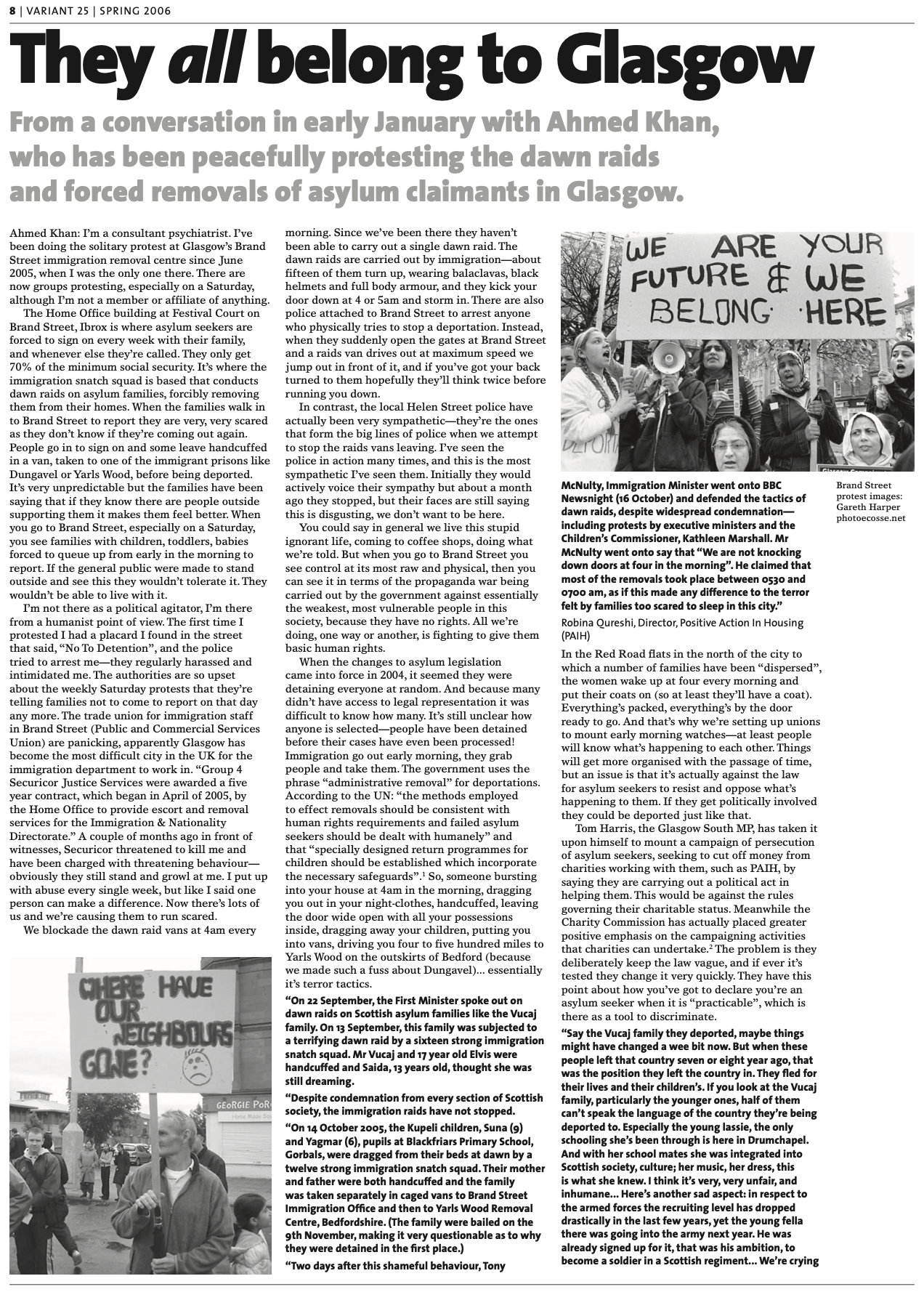
Excerpt from The Guardian: ‘A special day’: how a Glasgow community halted immigration raid, May 14, 2021
Let them go! Let them go! [...]
We are here for our neighbours, we are standing for each other, you know we are not allowing brutality in our streets, where you know people come and bundle you in the back of the van, you know, as though you have committed a very serious crime, no. But, we will stay until the end, when these guys are released [...].
The Young Lords
Excerpt from Arts in the City: The Young Lords, Denise Oliver-Velez, November 13, 2015
We didn't have the internet, we didn't have Twitter, we didn't have YouTube videos, so how do you take the information you've got and how do you get it out to people in the community other than by word of mouth? You need a vehicle and that vehicle was a newspaper.
Pitirre Vol. 2 No. 7, Summer 1970: To The Workers at Grant Hospital, Alberto Chavira
Como muchos deben saber, el Young Lords Organisation es un grupo compuesto en su mayoría por jóvenes puertorriqueños pero, también tiene entre sus filas mejicanos y colombianos, etc. Hace varios años atrás éramos lo que podría llamarse una “ganga”. [...] Hace alrededor de dos años comenzamos a ver que en muchas formas estábamos oprimiendo a nuestra propia gente y además estábamos en un callejón sin salida. [...] Comenzamos a hacer algunas cosas “buenas”: bailes, comprar ropa para familias necesitadas en las navidades, etc. Mas, eso no parecía llevarnos a ningún lugar y fuimos forzados a observar mas de cerca hacia donde nos movíamos. Tomó tiempo y llego lentamente, pero básicamente entendimos que si habíamos de ayudar a nuestra gente sería necesario virar toda esta sociedad al revés; el poder - económico, militar, gubernamental - tendría que ser arrebatado a las minorías blancas que controlan este país. [...] Entendimos que nuestra labor era y es educar al pueblo en torno a quien es su verdadero enemigo y como moverse en su contra. [...]
El hospital Grant es uno de esos enemigos. Encaja muy clara y eficientemente dentro de un sistema de salud que está diseñado para robar millones y millones de dólares en ganancias todos los años. [...]
Ustedes, sus empleados, también son víctimas de su codicia y su racismo. Solo miren a su alrededor - la mayor parte de la gente con educación, un buen salarió y autoridad [...] son gente blanca, mientras que los trabajos mas degradantes y los que menos pagan son ocupados por latinos y negros. [...]
Nosotros, el “Young Lords Organization”, decimos que un hospital que de veras desea servir a la gente, tampoco explota a sus empleados.
¡QUEREMOS QUE UNA JUNTA DE EMPLEADOS Y DE MIEMBROS DE LA COMUNIDAD CONTROLE AL HOSPITAL GRANT!
Alberto Chavira, Y.L.O
---
As some of you might know, the Young Lords Organization is a youth group made up mostly of Puerto Ricans, but also a few Mexicans, Colombians, etc. A few years back we were what you could call a gang. [...] Then about two years ago we began to see that in many ways we were oppressing our own people and also that we were headed toward a dead-end [...]. We began to do a few "nice" things - throw dances, buy food or clothes for "needy" families at Christmas, etc. But that didn't seem to be going anywhere either, and we were forced to look more closely at what we were doing. It took time and came slowly, but basically we understood that if we were to help our people it would be necessary to turn this society completely upside down; that power - economic, military and governmental - would have to be taken away from the minority of white men that run this country. [...] We felt that our main job was and still is to educate people as to who their real enemies are and how to move against them. [...]
Grant Hospital is one of those enemies. It fits very neatly and efficiently into a health system that is designed to churn out millions of dollars of profits every year. [...]
You, the workers, also are victims of this criminal greed and racism. Just look around you - most of the people with a decent education, a good salary, and authority [...] are white men, while most of the lowest paying jobs are held by Latin and Black women. [...]
We, the Young Lords Organisation, say that a hospital which truly serves the people does not exploit its workers. [...]
WE WANT A COMMUNITY-WORKER BOARD TO CONTROL GRANT HOSPITAL.
Alberto Chavira, Young Lords Organisation
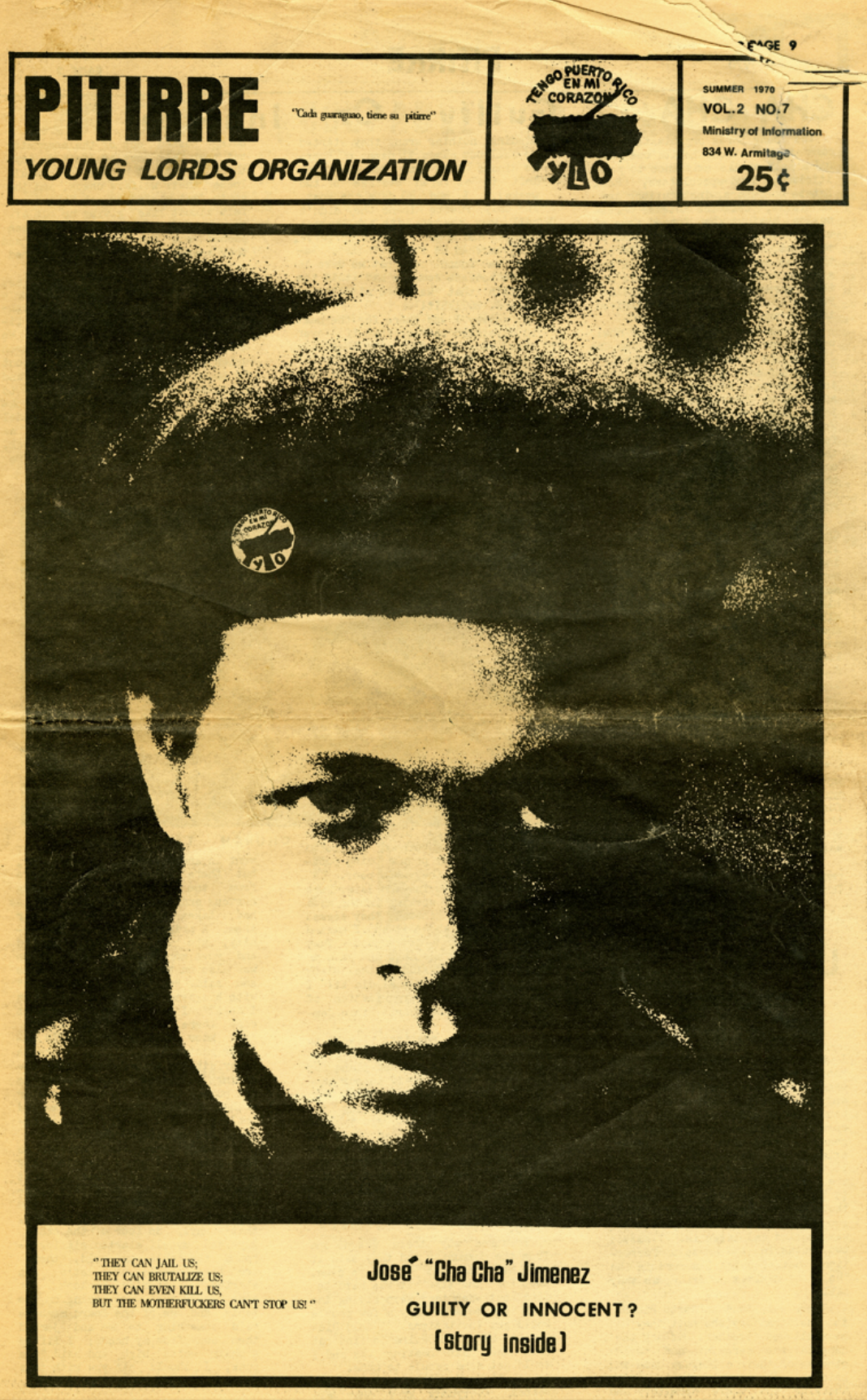
Excerpt from The Young Lords: The Puerto Rican Activists Who Shook Up NYC, Johanna Fernandez, February 6, 2020
[...] they gained a greater sense of what society is about, instinctively they understood that there was this thing called power and inequality and that they were on the losing side of that dyad, and in many ways they developed a second sight.
Zapatistas
Excerpt from Apenas 500 años después | Escuadrón Marítimo Zapatista / En voz de Yuli (6/7), August 15, 2021
Como comunidades zapatistas que somos, vemos señales, pero tal vez, estamos equivocados, como pueblos que somos. Ya ven que dicen que somos ignorantes, retrasados, conservadores, opositores al progreso, premodernos, bárbaros, incivilizados, inoportunos e inconvenientes. Tal vez es así. [...]
---
As the Zapatista communities that we are, we see signals, but perhaps we are mistaken, as the people that we are. You see, they say that we are ignorant, backward, conservative, against progress, pre-modern, barbarians, uncivilized, inopportune and uncivilized. Maybe that is how it is. [...]
Casi 11 años al día desde que el gobierno mexicano diera órdenes para su aprehensión, el Subcomandante Marcos, en su nueva función como “Delegado Cero,” entró a la prisión de Ixcotél, no a “entregarse,” sino a reunirse con presos políticos comprometidos a participar en La Otra Campaña. [...] Salió de Ixcotél con un mensaje potente: “Ellos (los prisioneros políticos) han dado su palabra y dicen que se mantienen firmes y no se darán por vencidos. Consideran la cárcel como un sitio más de la lucha y en unas pocas semanas empezarán una serie de actividades como parte de su participación en La Otra Campaña...estamos comprometidos como Zapatistas e invitamos al resto de las organizaciones y los miembros de La Otra Campaña para darle la máxima prioridad en este primer tour a la lucha por la liberación de todos los presos políticos y la cancelación de todas las órdenes de arresto [...] que existan contra los combatientes por la justicia social”.
---
Almost 11 years to the day since the Mexican government issued orders for his capture, Subcomandante Marcos, in his new role as “Delegate Zero,” entered Ixcotél Prison of his own accord, not to “turn himself in,” but to meet with political prisoners committed to building The Other Campaign. [He] came out of Ixcotél with a powerful message: “They (the political prisoners) have given their word and say that they are firm and will not surrender. They are considering the jail as one more site of struggle and in a few weeks they will begin a series of activities as part of their adherence to the Other Campaign... We are committed as Zapatistas and we invite the rest of the organizations and all members of the Other Campaign to give top priority in this first tour to the struggle for the liberation of all political prisoners and the cancellation of all arrest warrants [...] that there are against fighters for social justice.”
[...] Inspired by the Zapatista’s autonomous municipalities, Critical Resistance NYC is building the capacity to create community alternatives to police, prisons, and surveillance through the Harm Free Zone project (HFZ). This involves uncovering and encouraging mechanisms of community accountability.
A strength that we abolitionists share with the Zapatistas is that we reach into the founding struggles of our country to create a powerful, radical vision for today. In the 1840s, the abolitionists were at the forefront in opposing the imperialist US-Mexican War. Today, abolitionists in the USA have the opportunity to join in work and dialogue with “the simple and humble people who fight” in The Other Campaign of Mexico.
---
Inspirado por las municipalidades autónomas de los Zapatistas, Resistencia Crítica de la Ciudad de Nueva York está desarrollando la capacidad de crear alternativas comunitarias a la policía, las cárceles y a la vigilancia a través del Proyecto de Zona Libre de Perjuicio (Harm Free Zone Project - HFZ). Esto incluye el descubrir y fomentar mecanismos de responsabilidad de las comunidades.
Una fuerza que los abolicionistas compartimos con los Zapatistas es que utilizamos las luchas históricas de nuestro país para crear una poderosa visión radical para el presente. En la década de 1840, los abolicionistas tomaron oposición a la guerra imperialista de EE.UU.- México. Hoy, los abolicionistas en los EE.UU. tienen la oportunidad de trabajar y dialogar con “la gente sencilla y humilde que lucha” de La Otra Campaña de México.
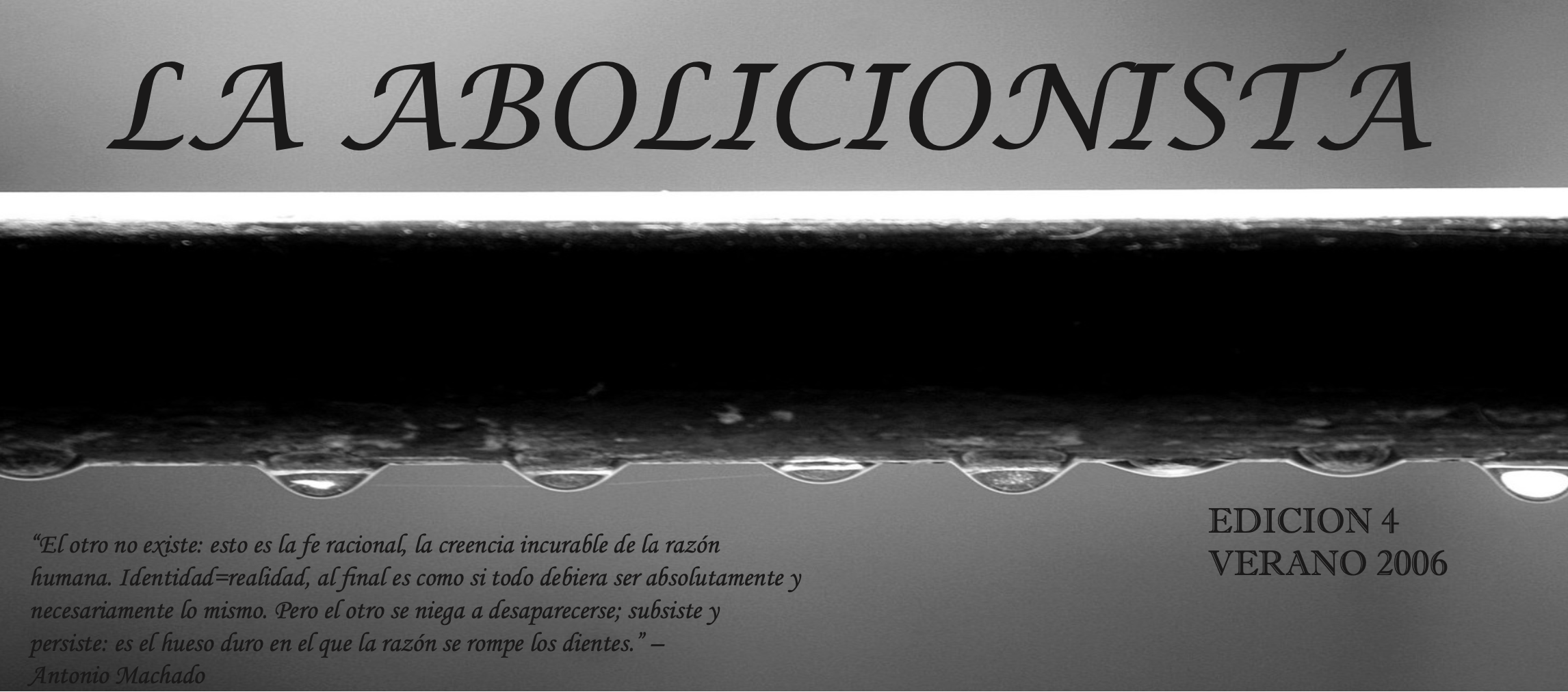
Excerpt from Interview with Subcomandante Marcos of the EZLN - Kerry Appel, January, 1997
Cualquier defensa de la humanidad ahora es una lucha contra el neoliberalismo como antes fue contra el fascismo a mediados del siglo - de este siglo 20 que está por terminar. Entonces podemos decirlo así: el cuerpo de la rebelión zapatista es indígena, el corazón de su rebelión es el de la dignidad de todos los excluidos que hay en el mundo en contra del poder.
---
We insist that whatever defense of humanity now is a struggle against neoliberalism as it was before against fascism in the middle of the 20th century that is about to end. We can say it that way, that the body of the Zapatista rebellion is indigenous and the heart of its rebellion is the dignity of all the "excluded" in the world against power.
Credits
Abolition A-Z was written and produced by Ivan Robirosa and Alejandro Van Zandt-Escobar over the Summer of 2021. It is part of MayDay Radio's 2021 Commission Series, part supported by MayDay Rooms.
Thank you to those who read the texts from the archive: Mila Trezkova, J. Playfair, Rebecca Glyn-Blanco, Sarah Fdili Alaoui, Lauren Vanzandt-Escobar, Joseph Paris, Issalaye Ndoye, Amelia Groom, Doris Escobar Van Zandt, Mim Lucy, Georgia Anderson, Sharon Phelan, Lila Robirosa, Antye Greie-Ripatti (AGF), M. Ty, Robin "Danger" Jaslet, Morgan Greenstreet, and Maria Luisa Angulo. Thank you to Jan Gerber for support with the website, to Robbie Blundell for designing the accompanying zine and graphics, to Kat Black for a copy-edit. Thank you to the team at MayDay Radio and at MayDay Rooms for supporting this project, with special thanks to Georgia Anderson and to our supporting producer Sam Dolbear.
